




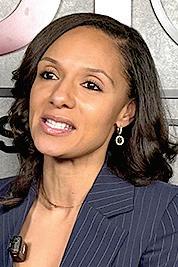



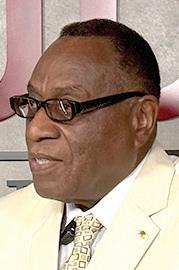


of life. Among the honorees were the brilliant and vi sionary co-founders of Detroit Hives, Nicole Lindsey and Timothy Paul Jackson. Their work has not only changed the landscape of beekeeping and urban farming in Detroit but also exemplified the transformative impact Black professionals can have on their communities.
By Ebony JJ Curry SENIOR REPORTER
Dalso expressed disappointment in a statement, saying the company immediately went into contingency mode to protect its operations.
By Ebony JJ Curry SENIOR REPORTER
so I take a lot of pride in the fact that our business rep resents our city’s pride.”
“Together we have created a social, environmental, and financial impact through bees,” said Jackson. Lindsey followed that sentiment with, “It is through our local partnerships and collaborative efforts that we exist in over 28 plus locations managing the health of 4.5 million honeybees – humbly speaking our movement has inspired others locally, nationally, and even internationally to take on similar missions.”
etroit’s next chapter is being written now.
The UAW has branded the industrial action as the “Stand-Up Strike,” focusing on specific plants within each automaker. UAW President Shawn Fain stated, “This strategy will keep the companies guessing. It will give our national negotiators maximum leverage and flexibility in bargaining. And if we need to go all out, we will. Everything is on the table.” Union leaders have also indicated that additional plants could be targeted in future waves if negotiations remain stalled.
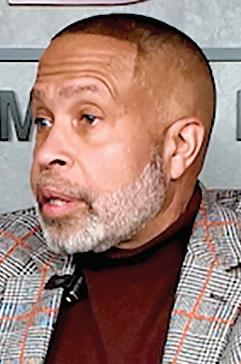
Taking home the Corporate Excellence Award was Dannis Mitchell, Director of Community Engagement at Barton Malow.
committed to building a safer, family-friendly Detroit where future generations can thrive.
By Andre Ash DIGITAL ANCHOR
ness district that had been the lifeblood of the community.
As the April 22 deadline passed, nine candidates officially filed petitions with City Clerk Janice Winfrey’s office, each staking their claim to lead a city built on resilience, revolution, and relentless hope.
Detroit Hives, a pioneering organization founded by Lindsey and Jackson, harnesses the power of urban beekeeping to revitalize neighborhoods in the Motor City. Their initiative not only addresses critical issues like environmental conservation but also provides valuable education and employment opportunities to Black De-
For the first time in 12 years, the mayor’s seat is wide open—and for the first time since Coleman A. Young redefined Detroit’s future in 1974, the city is poised to once again elect a Black mayor. In a city where over 80% of residents are Black, this moment is more than expected—it’s necessary.
For many Detroiters, Interstate 375, or I-375, has long been just another stretch of urban highway, a concrete artery connecting different parts of the city. To some, it’s a mere convenience; to others, it’s an unremarkable part of their daily commute. However, there’s a deeper, far more troubling story beneath the surface of this seemingly ordinary freeway—a story of pain, displacement, and the lasting impact on Black Detroiters.
The field is as dynamic as the city itself: two current city councilmembers, a former council president, a former police chief, two entrepreneurs, the pastor of Detroit’s largest church, a leading attorney, and a community advocate stepping into the political arena. Their presence affirms a simple truth: Detroit’s leadership must reflect the people who have fought, stayed, and built here generation after generation.
“It is so important to recognize that there are young leaders across the country, many that are born here in Detroit. I represent our city nationally and I tell people, ‘Yea I’m a D-girl I’m from the west-side of Detroit,’” Mitchell expressed. “But more importantly, I’ve been able to have experiences within an industry that not many of us, specifically women of color, have the opportunity to engage in and I’ve been the youngest person in the room, the only Black person in the room, and the only Sistah in the room, and I really had to articulate the importance of showing up, giving chances when others won’t, and being persistent.” As a trailblazing Black woman thriving in a predominantly male-dominated industry, her unwavering commitment to fortifying the connections between businesses and Detroit’s communities is unde-
Perkins outlined his experience in activism, saying that his influence has resulted in changes ranging from rules on police stops to advancing the fight for reparations, and that he has always backed his efforts with personal investment, creating organizations like The People’s Voice to ensure our communities feel included and heard. These initiatives were not about politics—they were about empowerment. He believes in putting resources toward making lasting change and creating a future where younger generations and all Detroiters can take pride in the progress we achieve together.
It’s a history marred by pain, injustice, and economic devastation. More than 130,000 residents, primarily Black, were forcibly displaced. Families were uprooted, generational wealth was obliterated, and a thriving community was torn asunder. The wounds inflicted by I-375 run deep, transcending the physical barrier of a freeway to penetrate the very soul of Black Detroiters.
A string of shootings in Greektown in mid-April left both visitors and residents of this bustling downtown destination in awe. One of these shootings tragically claimed the life of a popular and beloved security guard following a dispute with a patron.
This painful legacy can be traced back to the nation’s interstate highway program of 1956—a program that aimed to connect the country but often did so at the expense of marginalized communities. In the case of I-375, it meant carving a path through the heart of Black Detroit, reinforcing segregation, and perpetuating inequality.
towards mending the wounds inflicted on Black Detroiters and restoring a sense of belonging that was so callously torn away in the past.
The I-375 Boulevard Project is about more than just correcting historical injustices; it’s about redefining the future. It will connect downtown Detroit to surrounding neighborhoods, bridging the gap that was placed upon the city decades ago.
The male suspect allegedly shot the guard before fleeing the scene, while his female companion is accused of concealing the weapon in her bra.
Kinloch stands as a candidate with no political experience, but he says he’s built something from the ground up, having taken over a church that had fewer than 100 members when he began leading it 27 years ago. Kinloch went on to say that he has watched people return to school, rebuild after prison, earn degrees, start families, and launch careers. “Without outside resources, we built from within, teaching self-reliance, collaboration, and community strength.” He says that leading a 105-year-old church without division for 27 years taught him how to cast vision, develop people, navigate politics, and lead with fiscal discipline, fairness, and compassion. Kinloch says that these experiences uniquely prepared him to inspire, innovate, and lead with dignity and respect—qualities “that truly set me apart as a leader for Detroit.”
By Andre Ash DIGITAL ANCHOR
Fain clarified the union’s strategy: “I want to give a major shoutout to the thousands of members who are on the picket lines right now fighting for all of us. The Stand-Up Strike is a new approach to striking. Instead of striking all plants at once, select locals will be called on to stand up and walk out on strike. This is our generation’s answer to the movement that built our union – the sit-down strikes of 1937. We told the Big 3 that Sept. 14 was the deadline and we meant it. We gave the companies our economic demands eight weeks ago and it took more than a month to get to the table.”
Candidates officially on the ballot are City Council President Mary Sheffield, City Councilman Fred Durhal III, former Detroit Police Chief James Craig, former Detroit City Council President Saunteel Jenkins, Triumph Church Pastor Rev. Solomon Kinloch Jr., entrepreneur Joel Haashiim, attorney Todd Perkins, entrepreneur Jonathan Barlow, and criminal justice advocate Dean Evans. Political activist Rogelio Landin, who missed the formal filing deadline, has pledged to continue his campaign as a write-in.
The tale begins in what is now Lafayette Park, once known as Black Bottom—a neighborhood rooted in African-American culture and history. Named after its dark, fertile soil, Black Bottom flourished during the mid1900s, nurturing the dreams and aspirations of prominent Detroiters like Coleman Young, Joe Louis, and numerous other Detroit legends. But in the name of urban renewal in the 1950s, this vibrant neighborhood was systematically dismantled, erased from the map, and replaced by a lifeless stretch of asphalt.
A Holistic Approach to Providing Shelter and Support for Detroit’s Unhoused People
Homelessness continues to plague urban communities, with families and individuals grappling with the challenges of making ends meet in today’s economic climate. Whether it’s struggling to meet monthly mortgage payments or coping with soaring rental costs in a housing market marked by shockingly high prices, a variety of factors contribute to the growing issue of people becoming unhoused.
To meet this moment, the Michigan Chronicle went beyond campaign flyers and press releases. We conducted exclusive one-on-one interviews with each candidate, asking them each the same set of 18 questions that touched on some of the city’s most pressing issues: public safety, the economy, schools, more affordable housing, development, sustainability, protecting the most vulnerable residents, upcoming financial hardships in the absence of federal funding, jobs, the future of technology in the city, and why residents should vote for them.
While the residential areas bore the brunt of this demolition, the heart of Black Bottom, its thriving business center, remained largely untouched. Restaurants, theaters, clubs, and bars—the very places that brought Detroit’s Black community together—were concentrated around Hastings Street, the epicenter of African-American culture in the city.
Housing Resource Helpline in response to the challenges that residents face in navigating the complex system of housing services. The helpline provides a single point of contact for people seeking housing assistance and connects them with the resources they need.
We gave every contender a true, equal opportunity to lay out their vision, their plans, and their goals for Detroit’s future. Just like the candidates involved in the race, their answers were wide-ranging and were tapped from their respective backgrounds as elected officials and their lived experiences as Detroiters.
The union is pushing for a comprehensive list of demands. This
Meagan DunnJulie Schneider
Then, in a cruel twist of fate, Hastings Street, too, was obliterated a few years later, making way for the construction of I-375. This marked the final blow, sealing the fate of Black Bottom and signaling the beginning of the end for Paradise Valley, the Black busi-
Historically, shelters have provided a temporary respite for those in need, often serving as the first or second option after exhausting alternatives like staying with friends or family. Shelters offer a place to rest one’s head and a warm meal, albeit sometimes for extended periods. For others, being unhoused means living in cars or makeshift outdoor settings.
By Lynzee Mychael MULTIMEDIA JOURNALIST
The causes of homelessness are as diverse and complex as the individuals experiencing it. In response, the City of Detroit has adopted a holistic approach to combat this issue.
“Providing services and high-quality housing to persons at risk of or who are experiencing homelessness is a key priority of the City of Detroit, said Julie Schneider, Director of Detroit’s Housing and Revitalization Department.
City Council President Sheffield, for instance, touted her experience in council and her impact on the city over the past decade-plus serving in her roles. “I’m someone who has been able to balance both community and people, which I think, is hard to do and have been someone who has proven to be a bridge builder and really bring the two together,” she said. Sheffield highlighted that for 12 years, she’s led Detroit with compassion, experience, and a commitment to service. As the youngest ever elected, she’s passed over 20 impactful pieces of legislation, balanced community needs with city operations, and helped approve 11 balanced budgets with consistent surpluses. She’s built trust by being a bridge—uniting residents and businesses, advocating for people while understanding the intricacies of government. Detroit needs leadership that prioritizes both development and community voice. She’s shown fiscal discipline, deep community trust, and the ability to navigate corporate and grassroots spaces alike. She says she is a proven uniter ready for Detroit’s next chapter. Similarly, Durhal said how he brings unmatched experience, having served at both the state and city levels. In the Michigan Legislature, he says he worked across party lines to deliver over $1 billion for Detroit, supporting public safety, youth programs like DAPCEP, and senior services like Meals on Wheels. He says he also worked at the Michigan State Housing Development Authority, gaining firsthand knowledge of affordable housing needs. On City Council, he chaired the Budget, Finance, and Audit Committee and served as vice chair of Planning and Economic Development. As a parent of small children, he says that he is
For one to aptly recognize the harm caused by such projects, it is vital to note that some of the planners and politicians behind those projects built them directly through the heart of vibrant, populated communities—oftentimes to reinforce segregation and sometimes as part of a direct effort to replace or eliminate Black neighborhoods.
For Craig, Detroit’s former police chief, he is standing firm on his connections with the White House and his history in public safety. “I had a front seat, to how the city should run. And even more important, coming in when I came in and while it was controversial under emergency management, And the controversial part of it was that those elected to positions, didn’t have the power to execute on running the city.” Craig continued with examples of his executive leadership with eight years as Detroit’s police chief and service as deputy mayor. In that short window, he says he acted decisively—without political delays—to address urgent needs. For example, he says he reopened shuttered police precincts in high-density areas by repurposing vacant buildings, restoring critical services to neighborhoods. He says he understood from experience in other major cities how vital those resources are. He believes his track record shows he knows how to lead, make tough decisions, and deliver results that directly impact Detroiters’ daily lives.
Support for the helpline comes from the Gilbert Family Foundation, which has pledged $10 million over three years to fund the program. Wayne Metro Community Action Agency manages the helpline, making it accessible to all Detroit residents. This initiative simplifies access to the City’s various housing services, ensuring that residents in need can easily find assistance.
But now, after decades of enduring the scars of I-375, there is a glimmer of hope on the horizon. Plans have been unveiled to transform this once-divisive freeway into a vision that seeks to right the wrongs of the past while heralding a new era of inclusivity and community revitalization.
What a Federal Government Shutdown Could Mean for Detroiters? Comerica Celebrates 35 Years of
“This means focusing on building the pipeline of supportive housing and coordinating with the Continuum of Care on the delivery of critical resources such as emergency shelter, rapid rehousing, and diversion and prevention programs. It also means preserving and expanding affordable housing options for Detroiters of all incomes and improving housing stability though comprehensive service offerings available through the Detroit Housing Resource HelpLine and Detroit Housing Services Division within HRD.”
In May 2023, the City of Detroit launched the Detroit

From the days of the Great Migration when thousands of Black families flocked to Detroit in search of jobs and a better life, to the pivotal role they played in the city’s cultural and musical heritage, Black Detroiters have left an indelible mark on the city. However, in recent years, Detroit has experienced significant gentrification, which has raised concerns about the displacement of long-standing Black residents. Similar to a setting sun, there’s a rising spirit, and Black Detroiters are reclaiming their place
These incidents unfolded during an unseasonably warm spring, leading to increased pedestrian traffic and heightened tensions in the densely populated downtown area.
Today, the resurgence of Paradise Valley stands as a testament to the indomitable spirit of Black Detroiters and the enduring legacy of Black excellence. This historic district, once a vibrant hub for Black businesses and culture, is experiencing a renaissance that harkens back to its glory days. The destruction of Black Bottom may have torn apart a thriving community, but the resolute determination of a new generation of entrepreneurs and visionaries is reclaiming that lost legacy.
The surge in crime and the influx of visitors to Detroit’s downtown core garnered the attention of the Detroit Police Department (DPD), catching them somewhat off guard.
James White, Chief of Police for the Detroit Police Department, said: “We were caught somewhat flat-footed right out the gate. By design we went into the spring deployment, which is less than the mid-summer deployment, and saw we say an uptick in violence that first warm weekend.”
Fueled by more than $100 million from the Infrastructure Investment and Jobs Act and other partners, this ambitious project aims to create jobs, remove barriers to economic growth, and reconnect the neighborhood with the rest of Detroit. It is a step
Jenkins is the only candidate with elected experience and experience as a CEO. “I believe that is my lifetime of service. This isn’t new for me. I’m not running for mayor for a job. I had a fantastic job. I’m running for mayor because I believe at this moment in our city’s history as social worker, as the perfect person for the job,” she said. Jenkins said as a social worker, and experience in nonprofit, for-profit, education, and government, uniquely prepared her for this moment. The next mayor must build coalitions with business, philanthropy, and government, and she says that she’s done that. She says that her personal story is a Detroit story—working through school, surviving gun violence loss, and helping vulnerable families at the Heat and Warmth Fund. She was at the table during Detroit’s bankruptcy and know what it takes to keep the city moving forward.
In the heart of Paradise Valley, Blackowned businesses are not just flourishing but thriving, offering diverse services, products, and experiences that pay homage to the past while paving the way for a prosperous future. From jazz clubs to soul food restaurants, the Black Press, and art galleries to fashion boutiques, this revival is breathing life into the very essence of what once made this neighborhood a vibrant cultural epicenter. It’s a resurgence that extends beyond brick and mortar; it represents the resurgence of a spirit that refuses to be subdued.
Detroit City Councilman Fred Durhal III, representing District 7, where Eastern Market resides, told the Michigan Chronicle, “It’s still very early in the process, MDOT is
Chief White attributes the violence in Greektown to a combination of weather conditions and a surge in population. He explained, “ We saw numbers downtown that we have not seen, ever. People are emerging from COVID and there’s a feeling that we’re in a post-COVID era… and with the venues downtown and the reasons to come down with all the activities that are going on, we saw hundreds of more people and, in particularly, young folks, teenagers that we hadn’t seen.”
Responding swiftly to the surge in violence, DPD adjusted its deployment plans. Rather than waiting for mid-summer, they deployed officers in the spring itself to address the situation.
“The city and its partners offer a lot of great services to help Detroiters with their housing needs, but they don’t mean much if people don’t know how to access them,” said Mayor Mike Duggan. “Thanks to the efforts of our partners and the generous support of the Gilbert Family Foundation, we now have a simple process to guide residents to the right housing resource and a growing number of programs to help them.”
The Gilbert Family Foundation’s broader commitment involves pledging $500 million to support projects across Detroit over the next ten years, with housing initiatives being a significant part of their contribution.
Notably, Detroit has witnessed a consistent decrease in recent years, with the number of unhoused residents steadily declining. In 2019, approximately 7,847 people were unhoused and entered the City’s community response system. In 2021, about 5,687 people experienced homelessness.
Barlow says he’s the candidate that other candidates should be concerned about and that residents should be excited for. “I’m different and I play at a different level. It’s that simple. They do not. Meaning they, other competitors or other candidates or any other leader in this city do not play at the level I play at.” Barlow went on to say that others aren’t connecting Detroit to national initiatives on mass incarceration, reentry, and decriminalization like he is. He says that he understands how macro-level policies impact our city, and he works with local leaders like Derrick Woods and Kenneth Nixon to bring that insight home. Detroit has lost too much talent to other markets because we haven’t built systems to keep them, he says. Barlow says he knows where that talent went— and how to bring it back. He believes Detroit needs leadership that understands power, influence, and resources, and knows how to use them to uplift Detroit with transparency and real solutions.
The rise in visitors to the Greektown area is evident in data from Placer.ai, a location analytics company specializing in visit trends and demographic insights through geolocation-enabled mobile devices. From May 1-Aug. 27, 2022, there were 1.3 million visits and 655,000 visitors to Greektown, according to Placer.ai. In the same period this year, these numbers increased to 1.4 million visits and 670,000 visitors.
Haashiim, the international businessman, focused on the city’s need to at-
As Detroit’s downtown area continues to attract both residents and visitors, the police department has implemented various enforcement measures to manage the increased population. Notably, metal detectors have been strategically placed throughout Greektown to deter the illegal carrying of firearms.
because of discrimination, but they were also coming because Black people was doing some stuff. When did Black people start doing things in the city? They started doing things in this area in the 1800’s. In the 1800’s the major thing that they were doing in Detroit is they were the leaders in the fight against slavery. The Underground Railroad is the root in the city of Detroit to all of this Black innovation that you see coming later.”
According to the City of Detroit, since the start of the fiscal year 2019 to 2021, Detroit saw a 28% decrease in the
“We have strategically placed them at key points, “ Chief White explains. It has been a deterrent for some, and some have tested it. If you are legally carrying a weapon and carrying a CPL, have a great day. If you’re
Musical legends like Aretha Franklin, Marvin Gaye, and the Motown sound emerged from Detroit, providing a soundtrack for the civil rights movement and inspiring generations. Motown Records, founded by Berry Gordy Jr., was not just a record label but a symbol of

From page A-1
the rights of all women are continued.
cine and healthcare, may be adversely impacted by the decision to overturn Roe v. Wade.
Elected officials are also working to keep Roe v. Wade intact thus holding off Michigan’s 1931 trigger ban. Governor Gretchen Whitmer released a statement saying, in part:
tracting more international industries, which will create more jobs and more revenue to provide essential services. “I think I’m the most qualified to be mayor. Detroit needs international businesses. We need a diverse economy. We need to build it from the bottom up,” he said. Haashiim continued to say that this one of the most critical elections in Detroit’s history because the city is facing economic uncertainty, from auto plant instability to business downsizing and job loss. Detroit must diversify its economy and expand international partnerships—something he says that he’s done firsthand through 15 trade delegations. He says that his platform centers people, not just profit. He mentions that he’s not anti-corporate, but he believes tax dollars should empower residents with ownership, opportunity, and lasting equity. “Gentrification in Black cities happens when those in power prioritize corporations over community. We cannot afford more of the same. This is Detroit’s moment to build wealth, not watch it leave,” he said. Evans, who was not immediately available for an interview with the Chronicle, is a newcomer to the politscene, bringing his background in criminal justice to
“PPMI has been preparing for this moment since the results of the 2016 election were final. We recently filed a lawsuit to stop the 1931 law from going into effect, and we’ve also asked the state courts to affirm that the Michigan constitution does already contain a right to abortion. Our advocacy arm, Planned Parenthood Advocates of Michigan, is a founding member of the coalition that launched Reproductive Freedom for All, a ballot initiative to affirm the right to abortion and reproductive freedom in the state constitution,” said Vasquez Giroux. “The bottom line is that we will do everything in our power to keep abor tion legal in Michigan, and if SCOTUS makes that impossible, we will do everything we can to ensure our patients can access the care they need.”
“The words ‘Roe overturned’ are no longer theoretical. I want every Michigander to know— no matter what happens in D.C., I’m going to fight like hell to protect access to safe, legal abortion in Michigan…”
More than legal implications, overturning Roe v. Wade would impact several systems across the spectrum. With the potential to drive both foster and adoption numbers upward, a ban on abor-
his mayoral campaign. Focused on issues of public safety, Evans has garnered support from voters who are looking for leadership that understands the community’s concerns. As a first-time candidate, Evans emphasizes the importance of community engagement and being present on the ground to address the city’s most pressing issues.
More
what the Supreme Court will rule in the upcoming days. Despite the decision, advocates on both sides of the argument are willing to continue their pursuits.
While this article only highlights a portion of the lengthy conversations we had with each candidate, the entire videos can be found on May 1 on MichiganChronicle.com and on Michigan Chronicle’s YouTube channel, youtube.com/MichiganChronicle.
The Michigan Chronicle editorial board encourages people to watch each of the videos in their entirety to learn more about the candidates and their respective visions on Detroit’s most concerning issues. The interviews will paint a clearer picture about each of the candidates’ vision, give insight into their thoughts about how to solve key issues, and also tell you more about they type of person each candidate is.
“What we are really concerned about is the impact on our patients. Access to abortion is already out of reach for far too many Michiganders, especially Black people and people of color who face additional barriers to care as a result of systemic inequalities and institutional racism. Losing access to legal abortion will impact those communities most, forcing people to become parents or expand their families against their will. Being able to decide and control if, when and how to become a parent is central to building and living a healthy, happy life,” said Vasquez Giroux.
“Overturning Roe v. Wade would be a terrible break with nearly 50 years of judicial precedent and – more importantly – a blow against individual freedom. It is my hope that the majority of justices will reject the findings of this draft. If that is not the case, we need to stand with Senate Majority Leader Schumer and Gov. Whitmer in support of their efforts to preserve the right to reproductive freedom,” said Chair Alisha Bell, on behalf of the Wayne County Commission.
Detroit stands at a crossroads. The movement forward will not be defined by who shouts the loudest, but by who listens, who leads, and who understands the soul of this city. Through these exclusive conversations, we aim to equip the people of Detroit with what they deserve: the full story—and the power to decide what comes next.






Urging the House Government Operations Committee to hold hearings on HB 5013 and other legislation that would ban or limit the use of noknock or quick knock warrants, and urging the state legislature to pass meaningful reform and advise Gov. Whitmer to sign the bill after the leg-
judgment necessary to present complex information to students that are grounded in provable facts and add to the understanding of modern-day America.
By Jeremy Allen EXECUTIVE EDITOR
Increase mental health supports for the Black community: Recommend ing Michigan set a goal of increasing the number of Black mental health service providers by 20% each year over five years.
“BLAC members have worked hard to identify the needs of the Black community and we feel these recommendations will provide a solid first step towards breaking down barriers in educa
In a significant political development, more than 150 pastors and clergy leaders from across Michigan gathered in Detroit Monday morning to publicly endorsed Mike Duggan in his bid for governor. Duggan, who is running as an Independent, received the backing of spiritual leaders from cities including Detroit, Grand Rapids, and Flint—a strong sign of his growing appeal beyond traditional party lines.
the chancellor embraces.
But beyond the headline—why does this matter for Black Michigan residents?
Detroit Mayor Mike Duggan, long a political figure synonymous with the city’s turnaround narrative, is now courting voters statewide. His endorsement by a powerful bloc of clergy—many of whom have deep roots in Detroit’s neighborhoods and civil rights traditions—signals not just a campaign milestone but a moment of reckoning for the state’s Black electorate.
“No one should ever take our vote for granted. We have learned that you must earn this most treasured asset,” said Rev. Dr. Wendell Anthony of Fellowship Chapel in Detroit. “Mike Duggan has earned by his leadership to revitalize our city from downtown to the neighborhoods, establishing the Shot Stoppers Violent Intervention Program to reduce crime, working together with me to provide internet connections and laptops for 51,000 K-12 Detroit Public School students and building an administration reflecting the diversity and collectivity of our community. It’s not about what he will do. It’s rather what he’s already done. As he did it for Detroit, he will do it for Michigan.”

“I think of transformational leadership as a thoughtful approach that causes people to change but also causes the systems and circumstances they are operating in to change too,” Ivory said. “Transformational change doesn’t just ask people to do certain things; it asks them to change their view of what’s possible and excites them to drive that change together because they believe that what they’re doing will create positive change for everyone. That’s how entire systems change because people believe that they need to for themselves and others to live better lives.”
“Chancellor Ivery is a true transformational leader and an outstand ing CEO, who is more than worthy of the CEO of the Year Award he just re ceived, “ said Prof. James C. Mays, who teaches entrepreneurship and supply chain manage ment at WCCCD’s Corpo rate College. “In his 27 years at WCCCD, Dr. Ivery has elevated WCCCD to become nationally recognized for excellence and innovation and preparing our students professionally and personally to do great things in the world.”
But how much of Detroit’s progress can truly be credited to Duggan—and how much of that progress has trickled down to Black neighborhoods still grappling with disinvestment, gentrification, and displacement? It’s not a question to overly criticized the three-term mayor, but one that truly dives into the effectiveness of his leadership and how it might translate at the next level.
For years, Duggan has worked closely with faith institutions to push initiatives like ShotStoppers, the Adopt a Park program, and Project Clean Slate. These programs, which offer criminal record expungement and neighborhood investment, have real implications for Black families in cities long overlooked by Lansing.
“This endorsement is about more than politics—this is about bringing real change to all of Michigan, just like Mike Duggan has done in Detroit,” said Rev. Daryl Gaddy of Pilgrim Rest Missionary Baptist Church in Grand Rapids. “Mike Duggan’s work in Detroit—like reducing crime, recruiting jobs and investing in affordable housing—can serve as a roadmap…”
But the question remains: whose roadmap is this? Will Duggan’s Detroit legacy
critical issues affecting the Black community.
To learn more about BLAC and this upcoming event, visit www.michigan.gov/BLAC.
resonate with residents in cities like Flint, Benton Harbor, Pontiac, and Saginaw— places where Black communities continue to face water crises, education gaps, and economic neglect?
Clergy members highlighted his proven leadership, collaborative style, and practical solutions as reasons for their endorsement—qualities they believe can help transcend Michigan’s partisan divide.
“This endorsement is about more than politics. This is about bringing real change to all of Michigan, just like Mike Duggan has done in Detroit,” said Senior Pastor Daryl Gaddy of Pilgrim Rest Missionary Baptist Church in Grand Rapids. “Mike Duggan’s work in Detroit—like reducing crime, recruiting jobs and investing in affordable housing—can serve as a roadmap for what he’ll do for Michiganders and the people on the west side are starting to take notice.”
Support from Mid-Michigan leaders further reinforced the idea that Duggan’s campaign is resonating statewide.
“Too many politicians spend too much time fighting for their party when they should be working for the people. Mike Duggan’s different,” said Associate Pastor Brent Richard of International Gospel Center in Flint. “I’m convinced we need an Independent like Mike Duggan who’s not going to engage in petty fights but will build bridges that improve the quality of life for people across Michigan.”
The faith leaders who gathered in Duggan’s corner say that his record speaks to a broader ability to unify across political lines—a message that may appeal to Black voters weary of partisan gridlock and empty promises.
“Mike Duggan gets things done. He’s proven he can bring people together, and that’s exactly what we need right now,” said Bishop Edgar L. Vann II, Senior Pastor of Second Ebenezer Church. “Because of his vision and commitment to partnership, communities have received vital investments and support to help them grow.”
But as Duggan leans into this momentum—bolstered not only by faith leaders but by major labor unions—Black voters must ask: what does real inclusion look like in a Duggan-led Michigan? Will the administration prioritize equity beyond the headlines?
Duggan’s gubernatorial pitch is built on the success narrative of Detroit’s revival— lower crime rates, improved city services, and over $1 billion invested in affordable housing. But questions about equitable access, long-term affordability, and community ownership continue to swirl.
“Faith leaders have always understood something politicians often forget—when someone needs help, you show up. You don’t ask what party they belong to, or who they voted for—you act. That’s the spirit I’m carrying into this Independent campaign,” said Duggan. “I’m deeply honored to have the support of so many faith-based leaders across Michigan. This community really understands what I’m trying to do by getting people to work together to do what’s right. That’s how we change lives—and that’s how we’ll change Michigan.” He also quipped that election day in November will be the new “Independence Day” for Michigan residents.
For Black voters in Michigan—especially those in communities that have long strug-
gled to get a fair share of state resources— Duggan’s campaign may be offering a new approach. The question is: will it be enough?
Duggan’s campaign has gained momentum with endorsements from both faith leaders and major labor unions representing over 11,000 workers across the state. Many see his candidacy as a refreshing alternative in a polarized political climate.
During his time as mayor, Duggan led Detroit through a historic turnaround— bringing unemployment down, cutting crime to record lows, and attracting billions in investment, including more than $1 billion for affordable housing. These achievements have positioned Detroit as a national model for urban revitalization, and supporters believe Duggan can bring the same success to the state level.
As Duggan continues to build a broad coalition, his Independent candidacy is shaping up to be a potentially transformative force in Michigan politics.


A3 | April 30 - May 6, 2025
By Governor Gretchen Whitmer
It’s pothole season once again in Michigan. Countless drivers are white knuckling their cars and hoping they don’t pop a tire or bust a rim. Michigan has notoriously bad roads, and I ran for office in 2018 to fix them. While I’m proud of the historic progress we’ve made, there’s still a lot more work to do. Today, I want to talk about how we can work together this year fix the damn roads for the long-term so we can keep people safe behind the wheel and lower costs for families today and in the future.
Roads are the backbone of our communities. They connect us, ensuring deliveries show up on time, people get where they need to go, and families can put down roots in our communities. Bad roads hinder growth and delay goods and services. Workers face longer commutes and higher repair costs. In Wayne County just 18% of roads are considered “good.” In Detroit, drivers pay more than $3,000 a year in road-related costs. This is unacceptable. To grow our economy, create jobs, and make Michigan a better place to live, it must change.
Over decades, we’ve consistently refused to invest in our roads. In 1997, we needed a 10- to 12-cent-per-gallon gas tax increase to raise the necessary revenue. But we got less than half that. The same story repeated in 2012. While Governor Snyder signed a $1.2 billion road funding package into law, it was just a start.

In 2018, I ran for governor to finish the job and fix the damn roads. After going to all 83 counties and meeting people from all walks of life, what I heard everywhere was that the fundamentals were broken. People wanted better roads so they could go to work, drop their kids off at school, and run errands without popping a tire or cracking their windshield. In 2020, I launched Rebuilding Michigan, a bond plan to fix our busiest highways and bridges. It’s made an enormous difference, especially in Metro Detroit, making longterm upgrades to important highways like 96, 275, 75, and 696. Since 2019, we’ve fixed more than 23,000 lane miles of roads and 1,600 bridges, all without raising taxes on drivers.
As I said in my state of the state address this year, however, Rebuilding Michigan was always a shortterm fix for a long-term problem. Our roads are still crumbling faster than we can fix them. That’s why I’m working with Speaker Hall and Majority Leader Brinks to find a long-term, bipartisan solution to fix the damn roads once and for all. I’m committed to getting this done without taking money away from police officers, firefighters, housing, or economic growth. I’m grateful for Speaker Hall’s engagement on this issue.
But I need your help. If you’ll benefit from fixing the damn roads—whether through more money in your pocket thanks to fewer car repairs or a shorter and safer commute—please make your voice heard. Reach out to your elected officials and tell them how you feel. Together, we can fix the damn roads and grow Michigan’s economy.

By Amber Ogden STAFF WRITER
The city of Detroit emerged as a national model for inclusive economic empowerment by launching a transformative two-part experience focused on ambition, unity, and generational wealth. Presented by Bank of America in partnership with The Michigan Chronicle, the landmark initiative brought together changemakers, entrepreneurs, and community leaders for deep engagement around building lasting legacies in Black and under-resourced communities.
The first installment, “Bridging Ambition and Wealth: A Networking Experience for Legacy Builders,” took place Wednesday evening, April 23, inside the historic Michigan Central Station, symbolizing Detroit’s revitalization and forward momentum. More than 200 attendees gathered for an intimate evening of inspiration, high-level networking, and powerful conversation.
At the heart of the event was keynote speaker Mark Wilson, a nationally celebrated entrepreneur, and author of the bestselling book The Remarkable Power of Us. In his address, Wilson challenged attendees to move beyond traditional metrics of success and instead focus on building collective prosperity.
“Take your phone out and take a selfie,”
“Now, imagine that Bank of America just told me to let each one of you know that they’re going to invest a million dollars and deposit a million dollars into your bank account tomor-
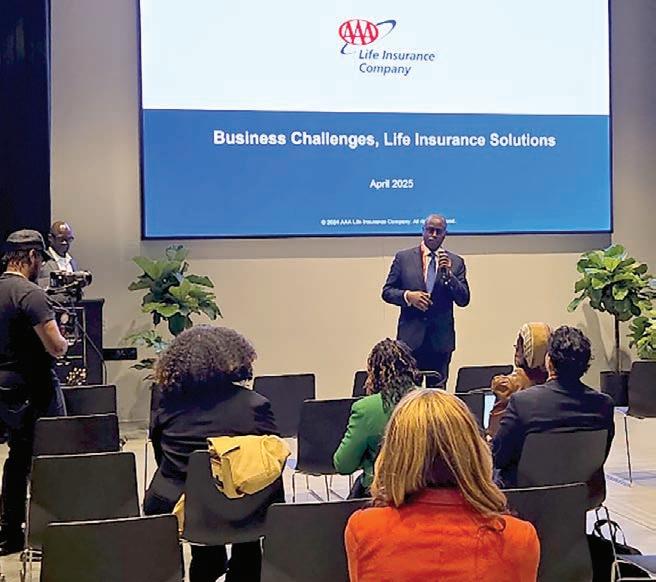
row. Imagine what that feeling is right now. Now take another selfie,” Wilson asked the audience before starting his keynote.
Wilson’s message resonated deeply, particularly as the city of Detroit, where over 77% of residents identify as Black or African American, continues its journey toward economic inclusion. Despite Detroit’s rich history of Black entrepreneurship, systemic barriers remain: according to the Brookings Institution, only 2% of U.S. businesses are Black-owned, and Black families hold roughly one-tenth the
wealth of white families on average.
“We are not waiting on a new reality. We are the new reality. We are the builders of bridges where walls once stood. We are the generation that refuses to be defined by limitation,” Wilson said.
Wilson urged attendees to rewrite that narrative by investing in each other and in the long-term development of their communities.
“Our strength comes from struggle.
Page A-4
“To Lead Detroit, You Must Do Hard Things”: New Report Demands Next Mayor Prioritize
By Ebony JJ Curry SENIOR REPORTER
Detroit stands at another crossroads. But this time, it’s not just about who wins an election—it’s about whether Detroit finally centers its people in policy or continues a legacy of planning that leaves its legacy residents behind. As signatures close and the mayoral race officially shifts into gear, Detroit Future City (DFC) has delivered more than a policy paper. It’s a challenge. A roadmap. A mirror. And for anyone aiming to occupy the mayor’s office come January, it’s a test of whether they are ready to lead with the kind of vision that speaks to Detroit’s present while repairing the fractures of its past.
DFC’s latest report, “Opportunities for the Next Mayoral Administration to Grow Detroit’s Middle Class,” calls attention to the economic inequities that still define Detroit’s neighborhoods. It outlines a blueprint centered on three priorities—building middle-class neighborhoods, generating wealth, and investing in climate-resilient infrastructure. While those words may echo themes from past administrations, this report cuts deeper. It refuses to gloss over the realities of how development has operated in Detroit for the last several decades—extractive, exclusionary, and often experimental on Black communities.
Only 26% of Detroit households fall within the middle-class income range of $62,000 to $155,000. That figure trails far behind the regional average of 39%. To Anika Goss, CEO of DFC, that stat alone reveals something deeper: a persistent failure to center economic equity in city governance. She notes that while the Duggan administration played a necessary role in

stabilizing the city after bankruptcy, Detroit now needs leadership with a different charge.
“We were coming out of bankruptcy. We needed to identify investors in Detroit and we needed to stabilize the budget. All of it was unprecedented. But going forward, the question is—how do we build on that momentum to make sure every Detroiter has every opportunity to participate in an economic future?” she said. “Detroit is 77% Black, but that 77% is not participating in the economy. The next mayor will have to maintain investor confidence while repositioning Detroiters for growth wages and true economic inclusion.”
That duality—balancing economic growth with racial equity—is the throughline of DFC’s report. It emphasizes that building a true middle class in Detroit can’t be surface-level. It has to be intentional. It has to include wraparound supports, hous-
ing access, quality schools, and community-led safety initiatives. Goss is clear: the next mayor has to see beyond profit margins and recognize that growing the middle class is inseparable from investing in Detroiters as full participants in their neighborhoods.
But what does it mean to build a middle class from the ground up when the ground has been stripped bare?
Detroit’s public schools are still under-resourced. Public transit often fails to connect workers to regional job opportunities. Whole blocks of housing stock sit crumbling or vacant. Goss acknowledges this isn’t a simple fix—but it’s a necessary one.
“The mayor doesn’t really have control over the schools. But the superintendent has to be the next mayor’s best friend,” she said. “Detroiters should be in Detroit schools. If
we can’t even get our kids an associate’s degree or a trade, then we’re failing. And transportation—that’s one of the hardest things. But at a minimum, our system has to get people to school and work. That has to be at the top of the next mayor’s list.” She pushes that vision further when it comes to housing. Detroit doesn’t need to build its way out—it needs to reinvest in what already exists. “We could repopulate the city without building a single new house. But housing isn’t just about buildings. Housing is the neighborhood. You should be able to grow your income and still live here. Right now, that’s not the case for too many people.”
The conversation around wealth in Detroit cannot move forward without confronting how Black families have historically been locked out of wealth accumulation. That includes heirs’ property, a quiet but powerful force in both preserving and destabilizing generational wealth. DFC’s report urges the city to adopt reforms that support Black land retention.
“There’s $300 million of real estate locked up in heirs’ property in Detroit,” Goss explained. “That alone tells us this matters. We have to normalize estate planning in our community the same way we plan funerals. If you planned a funeral, you should also know who owns the house.” Policy shifts are already underway. Wayne County now holds off on foreclosing properties flagged with heirs’ issues until they’re resolved. Michigan also leads the country in partition law reform, which prevents outside buyers from forcing the sale of inherited family property. But those policies are only the beginning.
From page A-3
We’ve learned how to make $1 out of 15 cents and we’ve learned how to make a way out of no way,” Wilson said.
Following the keynote, attendees participated in a book signing and informal networking session, facilitated by curated conversation prompts and interactive exhibits. The energy in the room was electric.
Entrepreneurs shared ideas, nonprofit leaders brainstormed partnerships, and legacy builders from across industries found common ground.
Ed Siaje, president of Bank of America Detroit, highlighted the commitment to the future of general wealth.
“We’re proud to share our vision to connect with our community and with so many incredible organizations in helping to provide tools and support needed to build real generational wealth,” Siaje said.
“Legacy Builders is about celebrating the wealth of talent in the city and in investing in opportunities for Detroit’s future.”
Carla Walker-Miller, the founder and CEO of Walker-Miller Energy Services, is the first Black-owned company in Michigan to receive a B Corporation Certification and ranks among the largest waste reduction firms owned by African Americans and women in the nation. She shared a story about her parents being her family’s first entrepreneurs and how they paved the way for her family’s success.
“My dad had a day job, a night job and a weekend job. Creating that foundation was just work hard. My parents took our family from poverty to stability,” Walker-Miller said.
“I feel responsible to do that for my community, for anyone that I can impact positively.”
The momentum from Wednesday carried directly into Friday, April 25, with part two of the experience: “From Capital to Legacy: Unlocking Generational Success.
Held at the New Lab in Michigan Central Station, a state-of-the-art innovation hub, the workshop was designed to turn inspiration into action, offering attendees tactical insights into business growth, capital access, and long-term financial strategies.
The workshop featured a series of expert-led sessions, including Securing Your Legacy: Succession Strategies for Businesses, which provided guidance on how to preserve and transition ownership across generations. This is a critical challenge as more than 60% of Black-owned businesses lack a documented succession plan, according to a

2024 Goldman Sachs report.
Empowering Black Professionals to Build Wealth Through Real Estate, focused on property investment and equity building, is particularly important given that homeownership remains one of the most significant drivers of intergenerational wealth, yet only 44% of Black Americans own homes compared to 74% of white Americans (U.S. Census Bureau, 2023).
Crafting Your Investment Legacy, where attendees explored long-term strategies in stocks, retirement planning, and asset diversification to ensure that wealth outlasts the current generation.
In addition to the breakout sessions, participants were invited to the Bank of America Lounge, where private consultations with financial experts were available throughout the day. These one-on-one sessions helped attendees align their visions with realistic, personalized financial planning , a rare opportunity in a city where nearly 30% of residents are unbanked or underbanked, according to the Federal Reserve.
Attendee Lazar Favors, business owner, CEO of Black Spirits Legacy LLC, producer of the Detroit Black Film Festival, the Trinity International Film Festival, the Fearless Tribe Fanatic Film Festival, and The Collective Studios, was elated to participate in the workshops today. This is the energy and impact organizers had in mind.
“Today, it’s (about the) energy for me. We absorb great energy from great people. So it’s been great conversations all morning,” Favors said.
“We’ve been in business for quite
some time and we’re finally in a space where we’re going to need and seek that financial advisory component that would take us and secure the things that we’re trying to do in our businesses to the next level.”
Generational wealth means different things to everyone. To Favors and his wife, it means being comfortable, building a lasting empire, and trusting the future family to carry the torch.
“It means making sure that my daughter’s kids, great, great grandkids are financially and knowledgeable,” Favors said.
“Building things that last, and last and last to a point where we (wife) can be on our island at 95 years old still enjoying one another like we do.”
BOA’s collaboration with The Michigan Chronicle, the oldest African American newspaper in Detroit, guaranteed that the event was firmly grounded in the community’s history and cultural significance.
“Poverty has never been just about money. The time is now for us to turn these lessons into tangible assets,” Wilson said.
As the last session concluded on Friday afternoon, many attendees stayed behind to continue conversations, share contact information, and commit to collaborative projects. It was a clear signal that this was more than a moment; it was the beginning of a movement.
With its bold vision, practical insights, and emphasis on legacy, Detroit’s two-part experience proved that change isn’t just possible, it’s already happening. One connection, one strategy, one legacy at a time.
From page A-3
“There’s a whole movement forming around this. That’s family wealth. And if we don’t get this right, we’re going to lose more than just homes—we’ll lose history.”
DFC’s blueprint isn’t soft on accountability. It calls out the empty promises that have often followed workforce training programs, especially those targeted at Black Detroiters. For Goss, it’s not enough to build training pipelines—there has to be a guaranteed destination.
“We’re pushing trade programs, but where are the jobs?” she said. “This is where employers and the state have to be held accountable. If Detroiters go through training, they deserve jobs that pay. Not $12-an-hour scraps. Livable wages are part of the promise. If we’re not delivering that, then we’re setting people up for disappointment.”
That sense of urgency carries over into the conversation around climate justice. DFC doesn’t just frame environmental concerns as future problems—it names them as present-day emergencies. Detroiters, especially those on the east side, are already experiencing the consequences of aging infrastructure and redlining legacies that positioned low-income communities in flood-prone areas.
“Our infrastructure issues are rooted in structural racism,” Goss said. “Flooding, blackouts, heat islands—these aren’t accidents. They’re by design. The next mayor will need to challenge every level of government to change that.”
That includes pushing for accountability from utilities, rethinking energy access, and making public transit truly accessible. It also means addressing Detroit’s property tax system—one of the highest in the country—and rebalancing that burden by expanding the city’s middle class to support a broader tax base.
“We pay more in taxes than cities with better infrastructure. That’s unacceptable. A strong middle class is how we change that.”
When asked who controls the narrative around Detroit’s transformation, Goss doesn’t hesitate. “Detroit data should belong to Detroiters.”
She speaks to models like participatory budgeting and inclusive planning, where residents—not just agencies—shape policy. But she’s also clear this isn’t all on city government. “This has to include community organizations, universities, local leaders. A good mayor has partnerships in all of these areas. Transparency is everything.”
And when it comes to the question of whether this roadmap is realistic or simply ambitious, Goss doesn’t flinch.
“If you want to be mayor of this city, you have to do hard things,” she said. “Detroiters don’t want to ride a poverty train. They’re not interested in that narrative. A strong mayor should lead a strong city. This isn’t aspirational. This is necessary.”
As the candidates sharpen their platforms and voters begin to listen more closely, DFC’s report stands as both a challenge and a guidepost. Not because the ideas are new but because the time to act on them is now. The city cannot afford another round of planning that skips over the people it claims to serve. Detroit is watching. And this time, it’s asking for more than vision. It’s demanding proof of purpose.

Celebrating 25 Trailblazers
Transforming Southeast Michigan’s Non-Profit Community

At a time when the needs of our communities are growing and the landscape of funding is rapidly shifting, the strength and resilience of Southeast Michigan’s nonprofit leaders shine brighter than ever. The individuals featured in this year’s Applause! Salute to 25 Standout Non-Profit Leaders are more than organizational heads— they are visionaries, problem-solvers, and champions of change who continue to drive progress and uplift lives. Through innovation, collaboration, and an unwavering commitment to service, these leaders are redefining what it means to build a stronger, more equitable community.
As you read their stories, we invite you to be inspired by the extraordinary ways these trailblazers are shaping the future. Despite challenges, they persevere—adapting to new realities, finding creative solutions, and staying true to their missions. Their work reminds us all that leadership is not just about navigating change; it’s about igniting hope, building resilience, and leading with heart.
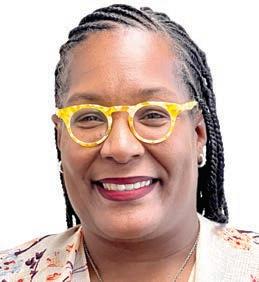
Starr Allen-Pettway President & CEO Matrix Human Services
The Michigan Chronicle’s APPLAUSE recognition celebrates leaders whose work uplifts, empowers, and transforms communities—and Starr Allen-Pettway is the embodiment of that mission. As President and CEO of Matrix Human Services, Starr leads Detroit’s largest human services agency, stewarding a $60 million annual budget and a team of over 500 dedicated professionals operating across more than 50 program sites.
Under her visionary leadership, Matrix continues to address the interconnected needs of Detroit’s most vulnerable neighborhoods through early childhood education, adult workforce training, community health, and senior wellness. Her strategic insight, operational expertise, and unwavering commitment to service have helped strengthen countless lives across the city.
A proud graduate of Howard University with a Master’s degree in Social Work and a Bachelor's in Psychology from Bennett College, Starr’s path has always been rooted in advocacy and impact. She first joined Matrix as Chief Operating Officer, where she was recognized for her ability to lead with excellence and build strong internal systems that drive results. In November 2024, she was appointed President & CEO, succeeding Brad Coulter and becoming a powerful force in shaping the agency’s future.
Starr Allen-Pettway’s leadership resonates deeply with the spirit of the Detroit MOTTEP Foundation’s “Meet The Moment” initiative—centered on health, wellness, and community readiness. Like the initiative, Starr’s work is grounded in education, empowerment, and equity. She is a trusted voice in the community, creating lasting impact through compassion, innovation, and collaboration.
For her extraordinary contributions and tireless dedication to Detroit, we proudly join the Michigan Chronicle in celebrating Starr Allen-Pettway with heartfelt APPLAUSE.

For more than 25 years, Dr. Remonia Chapman has been a passionate advocate for health equity and education across multicultural communities. As Program Director of the Detroit MOTTEP Foundation and Director of Gift of Life MOTTEP, she has transformed the conversation around organ and tissue donation, turning it into a movement of empowerment, awareness, and action.
Her work has helped shift Michigan’s donation landscape. Under her leadership, the multicultural donation rate more than doubled, from 10% to 25%. Detroit MOTTEP is now nationally recognized as a model program, celebrated for innovative education and deep-rooted partnerships that uplift communities of color.
For Dr. Chapman, this work is more than professional, it’s personal, spiritual, and deeply communal. From comforting donor families to training young advocates and speaking at town halls, she leads with compassion, purpose, and a commitment to service.
Her latest initiative, Meet the Moment: Empowering Minority Communities for Health, Wellness, and Readiness, promotes proactive health and informed decision-making, meeting people where they are with culturally relevant education and trusted partners.
Dr. Chapman has also held roles with Karmanos Cancer Institute, Multiplan, Inc., and several civic organizations. In 2021, she received the Trey Schwab Coaching Legacy Award, a Leadership Award from Michigan Medicine, and the Clive Callender Circle of Excellence Award. That same year, she earned her Doctor of Ministry from the Ecumenical Theological Seminary.
She has led partnerships with the American Cancer Society, the Michigan Eye Bank, and the National Marrow Donor Program, while serving on national boards that shape health policy and education. A proud member of Alpha Kappa Alpha Sorority, Inc. and an 18-year deacon at Hartford Memorial Baptist Church, Dr. Chapman is fueled by faith, community, and a calling to serve.
“I believe the community is the most powerful change agent,” says Dr. Chapman. “Every conversation, every event, every opportunity to educate—it matters. Because each moment is a chance to save a life.”
As she’s honored by the Michigan Chronicle’s APPLAUSE, Dr. Remonia Chapman stands as a testament to what it means to lead with heart, purpose, and unwavering impact

For more than four decades, Kenneth Donaldson has devoted his life to championing equity, education, and opportunity for children and families across Metro Detroit. As President and CEO of the Black United Fund of Michigan (BUF), he leads with vision, compassion, and a belief in the limitless potential of every child.
For over 50 years, BUF has served as a beacon of hope in historically underserved communities. Under Donaldson’s leadership, the organization reaches more than 3,500 youth each year through empowerment programs, philanthropy, and transformative partnerships.
BUF focuses on African American, Hispanic/Latino, and other minority youth—80% of whom are Black, and 15% from other diverse backgrounds. Its programs emphasize academic success, mentorship, career readiness, and emotional wellness, helping young people overcome barriers and thrive.
Impact is measured not just by numbers, but by transformation. BUF tracks how students grow, set goals, and connect their learning to future careers—with the aim of high school graduation, college completion, and a purposeful life.
Donaldson’s leadership was recently recognized with the Inspire Change Award from the Detroit Lions Foundation, which sparked an Aviation Exposure Day that introduced local youth and NFL players to careers in aviation—proving that exposure is the first step to empowerment.
With over 45 years of service in education, consulting, and mentorship, Donaldson has always believed that investing in youth uplifts entire communities.
“When we invest in our youth, we’re not just shaping their future—we’re building the future of our entire community,” he says.
As he is honored by the Michigan Chronicle’s APPLAUSE, Kenneth Donaldson’s legacy stands tall rooted in service, driven by purpose, and reflected in every life BUF has touched.

Anika Goss, Chief Executive Officer of Detroit Future City (DFC), is a transformative leader driving equitable and sustainable change in Detroit. Since taking the helm in 2015, Anika has repositioned DFC as a dynamic force for community and economic development, land use innovation, and sustainability. Under her leadership, DFC has launched the Center for Equity, Engagement, and Research, produced groundbreaking studies like “Growing Detroit’s African-American Middle Class” and “The State of Economic Equity in Detroit,” and developed an interactive Economic Equity Dashboard to track key indicators of progress over time.
Anika’s commitment to equity extends beyond research. She has spearheaded initiatives awarding over $330,000 in grants to revitalize vacant land and fostered a network of nearly 50 community leaders to implement green stormwater infrastructure practices. Her dedication to restorative justice is exemplified by DFC’s 2023 report, “A Call for Reparative Investment in Black Bottom Paradise Valley,” which advocates for reparative investments to restore wealth and culture lost to urban renewal. With nearly 25 years of experience in community development,
Anika’s impact resonates locally and nationally. She serves on the boards of prominent organizations like the Federal Reserve Bank of Chicago and has been recognized by Crain’s Detroit Business, Michigan Chronicle, and Corps! Magazine for her visionary leadership. Her recent TED Talk on Detroit’s climate resilience has reached over one million viewers, further amplifying her voice as a champion for equitable urban revitalization. Through her tireless efforts at DFC, Anika Goss is shaping a brighter future for Detroit—one rooted in equity, sustainability, and opportunity for all.

At the heart of Detroit PAL is a leader who believes that sports are just the beginning. Frederick Hunter, CEO of Detroit PAL, is a visionary committed to helping young people discover their greatness—on the field and far beyond it. A product of Detroit himself, Frederick understands the power of community, mentorship, and opportunity. His leadership reflects a deep-rooted belief that when young people are supported, inspired, and seen, they rise.
Since stepping into his role, Frederick has steered the organization toward growth, equity, and deeper impact. He has expanded PAL’s programming to serve thousands of youths across the city, prioritizing access, safety, and positive development. Under his leadership, Detroit PAL has introduced innovative ways to engage children—not just through athletics, but also through academic enrichment, leadership training, and life skills development.
Frederick’s approach is holistic. He champions strong relationships between mentors, coaches, and youth. He believes that when police officers coach teams and engage as role models, it opens doors for community trust and lasting change. He is also intentional about investing in girls’ sports and ensuring that every child, regardless of zip code or background, has the chance to participate, compete, and lead.
Behind every win at PAL is a team Frederick has built with care—coaches, volunteers, and staff who share his passion for Detroit’s youth. He has cultivated partnerships with local schools, city leaders, businesses, and national organizations, leveraging every connection to bring more opportunities to Detroit’s young people.
But perhaps what makes Frederick’s leadership most impactful is his unwavering commitment to purpose. He’s not just running an organization, he’s building a legacy of hope, unity, and possibility. In every huddle, every high-five, and every hard-fought game, he sees the future of Detroit taking shape.

Desiree Jennings, President and CEO of The Children’s Center of Wayne County (TCC), is a transformative leader dedicated to supporting Detroit’s children and families. Since joining TCC in 2010, she has progressed from Revenue Manager to CEO in May 2024, showcasing her talent and commitment to TCC’s mission of empowering children and families. Founded in 1929, TCC provides mental and behavioral health services, family enrichment programs, and child welfare services, impacting over 3,000 individuals annually. Under Desiree's leadership, TCC continues to grow, with a projected $20 million budget for FY 2025 and a team of 185 employees and 1,100 volunteers. Her tenure has seen significant achievements, including securing a $1.5 million funding increase and raising $1 million in fundraising between October and December 2024. Desiree has also introduced innovative programs such as the Family Success Center, offering essential resources like food, job training, and fatherhood support, while emphasizing inclusivity.
Desiree’s leadership is rooted in her commitment to culturally responsive care, particularly for Detroit’s youth, many of whom face poverty and trauma. She also led TCC through challenging times, including maintaining operations during the pandemic and improving financial efficiency.
Beyond TCC, Desiree serves on multiple boards and is deeply involved in advocating for children and families. A passionate, compassionate leader, Desiree Jennings is a role model for Metro Detroit youth and an inspiration to all.
Desiree’s dedication to the community makes her a deserving honoree of the Michigan Chronicle’s APPLAUSE recognition.

Cheryl P. Johnson, CEO of COTS (Coalition on Temporary Shelter), is a steadfast advocate for the homeless and marginalized populations in Detroit. With a heart for service and an unwavering commitment to transforming lives, Cheryl has dedicated her career to creating pathways to stability, opportunity, and hope for those in need.
Under Cheryl’s leadership, COTS has grown into a beacon of hope for families experiencing homelessness. Her vision centers on not just providing shelter but also empowering individuals and families with the tools they need to rebuild their lives. Cheryl understands that homelessness is a complex issue that requires a holistic approach—one that encompasses safe housing, mental health services, education, and workforce development.
Cheryl has been a driving force in expanding COTS’ programs and services, enhancing its outreach efforts, and advocating for systemic changes to address the root causes of homelessness. She is a passionate leader who tirelessly works to ensure that everyone, no matter their background, has a fair chance to thrive.
Her leadership is defined by compassion, collaboration, and a strong belief in the dignity of every individual. Cheryl has built strong partnerships with government agencies, local businesses, and nonprofit organizations, allowing COTS to amplify its impact and serve even more people in need. Her focus on collaboration ensures that COTS provides a comprehensive, community-driven approach to solving homelessness in Detroit.
Cheryl’s commitment to breaking the cycle of homelessness extends beyond immediate relief. She is focused on creating long-term solutions that empower individuals to achieve self-sufficiency and reclaim their independence. Through her work, Cheryl has become a symbol of resilience, advocating for the vulnerable and challenging the systems that perpetuate inequality.

Adrian Lewis
CEO,
Forgotten Harvest
Adrian Lewis, CEO of Forgotten Harvest, is a dedicated leader who is deeply committed to solving hunger in Detroit and beyond. With a heart for service and a clear vision, Adrian has taken the helm of one of Michigan’s largest food rescue organizations, transforming it into a powerful force for social change.
Under Adrian’s leadership, Forgotten Harvest has expanded its reach, increasing the amount of food rescued and redistributed to those in need.
His strategic guidance has led to more efficient operations, allowing the organization to meet the growing demand for nutritious food in underserved communities. Through his leadership, Forgotten Harvest has not only provided millions of meals but also raised awareness about the interconnected issues of hunger, food waste, and food insecurity.
Adrian is a strong advocate for systemic change. His work goes beyond providing food—it’s about addressing the root causes of hunger.
By forging strong partnerships with local businesses, nonprofits, and government agencies, Adrian has made Forgotten Harvest a central player in the effort to reduce food insecurity in Michigan. His dedication to sustainability has also led to innovative programs that minimize food waste and ensure that good food reaches those who need it most.
Adrian’s leadership is defined by his passion for community and his belief in creating lasting change. His strategic vision ensures that Forgotten Harvest continues to expand its impact, providing hope and nourishment to thousands of families while working to eliminate hunger altogether. His tireless commitment to alleviating food insecurity has earned him the respect and admiration of community leaders, colleagues, and the families who benefit from Forgotten Harvest’s work.
Through Adrian Lewis’ leadership, Forgotten Harvest has become a beacon of hope for many and a symbol of the power of collective action to tackle the critical issue of hunger.
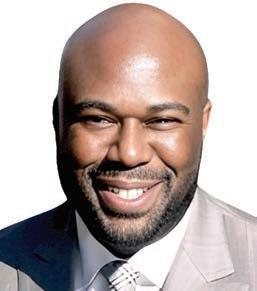
Rob Lockett Executive Director, LISC
Rob Lockett, Executive Director of the Local Initiatives Support Corporation (LISC) Detroit, is being recognized as a Michigan Chronicle APPLAUSE honoree for his transformative leadership in community development and housing preservation. With over 45 years of experience, LISC has played a pivotal role in revitalizing communities and improving the lives of low- to moderate-income residents, and Rob has been at the helm of these efforts in Detroit.
Under Rob’s leadership, LISC has expanded its housing programs to provide crucial support for homeowners facing financial hardship. One of his most significant accomplishments is the 0% Interest Home Repair Loan Program in Detroit, a $29M public-private partnership with the City of Detroit. This initiative has helped 775 homeowners in the city, many of whom are from historically underserved African American communities, make critical repairs without the burden of high-interest loans.
Additionally, Rob has been instrumental in launching programs like the Memphis Homeowner Empowerment Loan Program, helping homeowners in Memphis access financial resources for home repairs. Through his leadership, LISC has successfully replicated housing preservation programs across various cities, including Detroit, Cleveland, and Cincinnati, helping preserve homes and prevent displacement for families in need.
Beyond housing, Rob’s dedication to community empowerment extends to his focus on sustainable economic development and fostering stronger, more resilient neighborhoods. His work ensures that marginalized communities have the resources they need to thrive, stabilize, and rebuild. His unwavering commitment to affordable housing and community development has solidified his position as a key figure in Metro Detroit’s ongoing revitalization.
As a Michigan Chronicle APPLAUSE honoree, Rob Lockett's outstanding leadership continues to create lasting change, offering hope and stability to countless families in Detroit and beyond.

LaTrice McClendon is not just a leader—she’s a passionate advocate for the people and communities she serves. As the Executive Director of Community Partnerships at the Knight Foundation, LaTrice has become a driving force behind efforts to strengthen Detroit’s neighborhoods and uplift its residents, ensuring that everyone has the opportunity to thrive.
Under her leadership, the Knight Foundation has invested over $50 million in Detroit in the last five years, funding projects that focus on education, economic development, and neighborhood revitalization. LaTrice’s strategic vision centers on building relationships and empowering those who have been historically overlooked, ensuring that local residents have a voice in shaping their city’s future.
For LaTrice, it’s about more than just grants—it’s about meeting people where they are, listening to their needs, and fostering a sense of belonging. Her work has resulted in over $22 million in support through the Knight Arts Challenge, funding creative projects that directly impact Detroit’s cultural landscape.
Her leadership is driven by a simple, powerful principle: everyone deserves a seat at the table. LaTrice has worked tirelessly to ensure community leaders, particularly from underrepresented groups, have the support to make lasting change. Whether it’s backing grassroots organizations or building trust between residents and institutions, LaTrice ensures every corner of Detroit has the chance to flourish.
What sets LaTrice apart is her genuine love for Detroit and its people. She’s not just invested professionally, she’s personally committed. Her understanding of the challenges Detroiters face, combined with her optimism and belief in community, makes her a rare leader. She meets people where they are, listens to their stories, and collaborates to create meaningful change.
Under LaTrice’s leadership, the Knight Foundation has not only contributed to Detroit’s growth but also nurtured a community spirit that sustains lasting change. It’s about uplifting the people who make Detroit home and inspiring all of us to believe in the power of connection, compassion, and collective action.

Angelique Power’s leadership at the Skillman Foundation is a reflection of her unwavering commitment to the future of Detroit’s young people. As President and CEO, she has redefined how philanthropy can transform communities by centering youth voices and ensuring that young Detroiters are not only heard but empowered to drive change.
Under Angelique’s guidance, the Skillman Foundation has become a beacon for communitydriven solutions, focusing on building an ecosystem where young people thrive, especially in underrepresented areas. Her leadership is grounded in the belief that meaningful change starts with young people—by supporting their development, advocating for educational equity, and equipping them with the tools they need to navigate and overcome challenges.
Angelique has championed initiatives that expand access to education, foster positive community spaces, and provide resources to families facing adversity. With a passion for social justice, she works tirelessly to dismantle barriers that prevent youth from reaching their potential, and she is steadfast in her commitment to ensuring that all Detroit children have a fair chance to succeed, regardless of their background.
Her approach goes beyond philanthropy. It’s about equity, inclusion, and the vision of a thriving Detroit where young people are the driving force of change. By creating authentic, collaborative partnerships across sectors—local organizations, schools, and community leaders—Angelique continues to build a more inclusive, resilient, and innovative Detroit.
Her leadership at the Skillman Foundation is not just about funding programs—it’s about empowering youth to take ownership of their futures. By nurturing a community that values young people as catalysts for change, Angelique is shaping a future where Detroit’s children and teens can dream bigger, aim higher, and build the lives they deserve.

President & CEO, Hudson-Webber Foundation
Donald J. Rencher is a transformative leader dedicated to strengthening Detroit’s communities and fostering sustainable growth. As Executive Director of the Hudson-Webber Foundation, Donald’s approach to philanthropy is grounded in a deep understanding of Detroit’s complex history and its boundless potential. With a focus on equity, inclusion, and community empowerment, Donald is reshaping how foundations invest in cities by prioritizing the voices of those most impacted by change. Under Donald’s leadership, the Hudson-Webber Foundation has spearheaded initiatives that are catalyzing economic development, fostering neighborhood revitalization, and supporting the city's cultural and creative sectors. He is committed to building a Detroit that not only thrives economically but is also rooted in social justice and opportunity for all. Donald’s leadership style is defined by collaboration—he believes that by working together with local leaders, community organizations, and businesses, Detroit can emerge stronger and more connected. Donald’s work goes beyond funding projects; it’s about nurturing an ecosystem where every neighborhood can prosper. By focusing on long-term, sustainable impact, he ensures that the Foundation’s investments lead to meaningful change in Detroit’s most underserved communities. Donald is particularly passionate about the intersection of economic development and the arts, recognizing that cultural initiatives play a critical role in both community cohesion and economic revitalization.
With a background in law and a deep commitment to social justice, Donald uses his expertise to advocate for policies that create lasting change in Detroit. His work at the Hudson-Webber Foundation reflects a vision for a future where all Detroiters—regardless of race, income, or background—have the resources and opportunities to build better lives for themselves and their families. Through his leadership, the Foundation is ensuring that Detroit’s revitalization is equitable and inclusive, leaving no one behind.

CEO,
Caleb Rutledge, President and CEO of Goodwill's Green Works (GGW), is a dynamic leader who has positioned the organization as a national force in appliance recycling while providing vital employment opportunities for returning citizens. Since its founding in 2010, Green Works has operated as a subsidiary of Goodwill Industries of Greater Detroit, making a significant environmental and social impact under Caleb's direction.
Caleb's commitment to the community extends far beyond his role at Green Works. With 25 years of philanthropic contributions, he has been a pillar in the Detroit area, providing affordable housing, spearheading youth programming, and co-founding the Legacy Associates Foundation. His dedication to service is evident in every aspect of his work.
Under Caleb's leadership, Goodwill's Green Works has become the largest appliance recycler in the country. Last year alone, the organization recycled 24.5 million pounds of appliances and other materials, significantly reducing waste and promoting environmental sustainability. With an annual budget of $9 million and a dedicated team of 105 full-time and part-time employees, Green Works is making a tangible difference in both the environment and the lives of its employees.
What sets Green Works apart is its commitment to providing employment opportunities for returning citizens. An impressive 41% of the organization's staff are individuals who were formerly justice-involved, and over 90% of the employees are African American. By offering job training and support, Green Works empowers these individuals to rebuild their lives and contribute to the community.
Caleb Rutledge is a member of the Investment Recovery Association, Sustainability Supply Chain Alliance, and Environmental Management Associate. His leadership demonstrates how business can be a force for good, creating both environmental and social value. He is an example of how dedication and vision can transform an organization into a powerful engine for community development.

David Sampson is a compassionate leader whose unwavering commitment to Detroit’s most vulnerable populations has made a profound impact on the city. As CEO of Mariner’s Inn, David leads the organization in its mission to provide shelter, treatment, and support for individuals facing homelessness and substance use disorders. Under his leadership, Mariner’s Inn has become a beacon of hope, offering not only a safe space but also a pathway to healing, stability, and a brighter future.
David’s work is rooted in the belief that everyone deserves dignity and the opportunity to rebuild their lives. He is deeply committed to a holistic approach to recovery, one that integrates mental health support, workforce development, and community engagement to create lasting change. His leadership has propelled Mariner’s Inn to expand its services, providing lifechanging resources to men in need and helping them transition to self-sufficiency.
With over 30 years of experience in social services, David’s focus is on ensuring that those affected by homelessness and addiction are met with compassion, respect, and the tools they need to succeed. His passion for social justice drives him to advocate for policies that address the root causes of homelessness, while also working directly with community organizations, government agencies, and volunteers to create a more supportive environment for those in crisis.
David’s leadership at Mariner’s Inn goes beyond the day-to-day operations; he is a tireless advocate for systemic change, pushing for solutions that not only address immediate needs but also foster longterm stability for individuals and families. His work is a testament to the power of empathy, dedication, and collaboration in driving meaningful change for Detroit’s most marginalized communities.

Rev. Horace L. Sheffield CEO, Detroit Association of Black Organization (DABO)
Rev. Horace Sheffield is a towering figure in Detroit’s faith, civic, and nonprofit landscape—a leader whose life has been defined by unwavering commitment to justice, empowerment, and community. As Executive Director of Detroit Association of Black Organizations (DABO), Rev. Sheffield has dedicated decades to addressing health disparities, combating poverty, and providing vital support to those most in need.
Under his leadership, DABO has become a cornerstone in Detroit’s social service network, operating programs that range from youth development and substance abuse prevention to mental health awareness and community revitalization. Through initiatives like the Sheffield Center, the organization provides a safe haven and resource hub for families across the city.
Rev. Sheffield’s impact is both historic and deeply personal. A legacy civil rights leader who walked alongside Dr. Martin Luther King Jr., his advocacy spans generations—but his work remains urgently present. Whether championing equitable access to healthcare or standing at the front lines during a crisis, he is a voice for the voiceless and a servant-leader whose faith meets people exactly where they are.
What sets Rev. Sheffield apart is not just his bold leadership, but his heart for humanity. He’s not content with temporary fixes—he’s invested in long-term transformation. His efforts have helped countless Detroiters find hope, healing, and a path forward.
Through faith, resilience, and an unshakable belief in the power of people, Rev. Horace Sheffield continues to be a guiding light in Detroit’s ongoing story of strength and renewal.

DeLashea Strawder has been the driving force behind Mosaic Youth Theatre of Detroit, an organization that has shaped youth capacity, creativity, and community for over 30 years. Since becoming Executive Artistic Director in 2019, DeLashea has elevated Mosaic’s mission to new heights, ensuring its programs remain a vital part of Detroit’s arts landscape. Her leadership has resulted in national recognition, including the 2021 Lewis Prize for Music Accelerator Award, and local accolades such as Crain’s Detroit 40 Under 40 and Michigan Chronicle’s 40 Under 40.
Under her leadership, Mosaic has expanded its impact, providing equitable access to the arts and empowering youth through mentorship and leadership training. With a focus on building academic and artistic success, Mosaic boasts a remarkable 95% high school graduation rate among its participants, with 87.5% enrolling in post-secondary institutions. Through DeLashea’s innovative approach, Mosaic Youth Theatre of Detroit continues to nurture the next generation of creative leaders who are making lasting contributions to their communities. DeLashea’s impact extends beyond her role at Mosaic. She has served on various influential boards, including Culture Source and the National Creative Youth Development Action Committee, and remains a passionate advocate for arts education and youth development on a national level.
Her unwavering commitment to youth development, artistic excellence, and community engagement solidifies her as a true leader in Metro Detroit. DeLashea Strawder’s transformative leadership continues to inspire future generations of young artists, and her work ensures that Detroit’s cultural legacy remains vibrant and diverse for years to come.
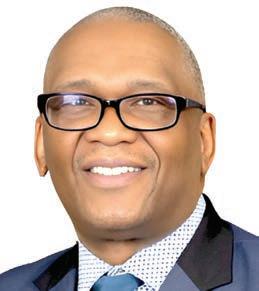
of Aging
Ronald S. Taylor is a passionate leader who has dedicated his career to improving the lives of Detroit's older adults. As the President and CEO of the Detroit Area Agency on Aging (DAAA), he has led with unwavering commitment to ensure that seniors in the community are supported, empowered, and able to live with dignity and independence. Under his leadership, DAAA has grown into a vital resource for thousands, with a budget of $73 million and a team of 150 professionals dedicated to making a real difference.
His vision extends far beyond basic services, creating a comprehensive support system that empowers seniors to stay in their homes and live fulfilling lives. Through innovative programs and partnerships, DAAA has been able to make significant strides in addressing the complex needs of Detroit’s aging population. In 2024, DAAA reported revenues of $105 million, a testament to the efficiency and effectiveness of their services. More than just numbers, this reflects the deep trust the community places in DAAA, especially in times of crisis. In the wake of the pandemic, Ronald's leadership ensured that DAAA’s services not only continued but grew, providing critical care to those who needed it most.
Beyond his role at DAAA, Ronald is a respected voice in aging and social services, contributing to boards such as the Detroit Wayne Integrated Health Network and the National Institute on Aging. His influence extends to policy, helping shape a future where seniors are valued and supported at every stage of life.
Ronald’s impact is measured not only by the financial success of DAAA but by the lives he’s touched, from the seniors who can age in place with dignity to the families who find peace knowing their loved ones are cared for. His work stands as a reminder that when we invest in our elders, we invest in the heart of our community.

Robin Terry, CEO and Board Chair of the Motown Museum, has skillfully guided one of Detroit’s most iconic landmarks through monumental growth and development. Since taking the helm, Robin led the museum through two phases of construction during the challenging Covid pandemic, ensuring visitor safety while maintaining its cultural importance. Under her leadership, the Motown Museum reached a remarkable $75 million goal to fund the third and final phase of its expansion, which will include a 40,000-square-foot addition with new exhibits, a café, and a 300-seat theater. This expansion will attract millions of visitors and create new opportunities for local artists and creatives.
Robin’s impact goes beyond bricks and mortar. Under her leadership, the Motown Museum has revitalized its community programs, empowering youth and adults through music, performance, and entrepreneurship. Initiatives like Ignite Summer Camp, Spark Summer Camp, and the Lyric Project provide platforms for young people to express themselves and explore careers in the arts. Helping the youth develop leadership skills, self-confidence, and a sense of purpose.
Robin’s commitment to community is rooted in the values of Motown’s founder, her grandmother, the late Esther Gordy. Robin honors her grandmother’s legacy by ensuring that the museum not only celebrates Motown’s history but also serves as a catalyst for positive change in Detroit. The Motown Museum has become more than just a cultural landmark—it is a space where creativity thrives, where young voices are heard, and where the power of music and art transforms lives.
The museum has become a beacon for cultural tourism in Detroit, attracting visitors worldwide while contributing significantly to the local economy. Bringing jobs, economic development, and opportunities for local artists, further cementing its role as a cornerstone of the city’s cultural renaissance.
Robin’s dedication to preserving Motown’s legacy while making it accessible to future generations demonstrates visionary leadership that fuels lasting community change. Her passion for music, culture, and family drives her to create a vibrant, inclusive future for Detroit and beyond.

Charles Thomas Founder, President & CEO, RESULTS Mentoring
Charles Thomas Jr. is a transformative leader who has dedicated his life to empowering at-risk youth in Metro Detroit through RESULTS Mentoring. Founded in 1999, RESULTS Mentoring has served over 5,000 students, providing critical support to help them overcome challenges and unlock their full potential. By offering mentoring, tutoring, and physical training programs, Thomas has created a nurturing environment where young men can thrive academically, socially, and emotionally.
With a background in educational leadership, Charles has used his extensive experience as a counselor, assistant principal, and mentor to design holistic programs that redirect negative behaviors and foster positive life skills. Through his leadership, RESULTS Mentoring has become a vital resource, serving approximately 150 students annually and achieving impressive results, such as reduced suspension rates and increased academic performance.
Thomas' dedication to mentorship is highlighted by the organization’s signature trip to Washington, D.C. and New York, which exposes students to cultural, historical, and leadership experiences. As a result, many of these young men are inspired to dream beyond their circumstances and pursue meaningful futures.
Named Mentor of the Year by the Michigan Community Service Commission and awarded the Michigan Governor's Service Award, Charles Thomas' impact continues to resonate throughout the community. His commitment to developing future leaders and his ability to maximize resources to drive success makes him a true pillar of Detroit's educational landscape.
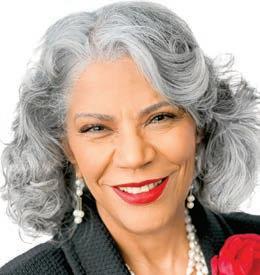
Pamela Martin-Turner President & CEO, Vanguard CDC
Pamela Martin Turner is a visionary leader whose transformative impact on Detroit’s North End community has made her a standout nonprofit leader. As the President and CEO of Vanguard Community Development Corporation (Vanguard), Pamela has led the organization through a remarkable transformation, turning it from a faith-based initiative into a comprehensive community development powerhouse. Under her leadership, Vanguard has launched over $53 million in development projects, including housing initiatives and home repair programs that directly benefit residents in need.
Through her efforts, Vanguard has secured $30 million in funding and developed nearly 400 affordable homes, improving the quality of life for North End families. One of her key achievements, the Home Repair Grant Program, has helped residents like a Detroit homeowner who had struggled for years with a dilapidated roof. By providing funding and allowing residents to choose their own contractors, Vanguard ensures that each homeowner receives tailored support for crucial repairs.
Pamela’s leadership extends beyond housing—she has been instrumental in revitalizing the North End Milwaukee Junction Business District, earning it Main Street District certification. Vanguard’s approach is rooted in listening to the community and offering solution-driven programs, from advocating for residents at city council meetings to tackling blight through the Clean & Safe Program.
Pamela Martin Turner’s leadership has been nothing short of transformative, ensuring the North End remains vibrant while securing a bright future for its residents. Her work exemplifies the power of nonprofit leadership and its ability to make lasting, positive change.

Parrish Underwood is a leader who is deeply committed to strengthening communities and creating opportunities for all.
As the CEO of the YMCA of Metropolitan Detroit, Parrish has made it his mission to ensure that every individual, regardless of background or circumstance, has access to the resources, support, and opportunities they need to thrive.
Since taking the helm, Parrish has spearheaded initiatives that have had a lasting impact on the Detroit area, including the expansion of youth development programs, affordable childcare, and health and wellness services. Under his leadership, the YMCA of Metropolitan Detroit has seen a 30% increase in membership, reflecting his success in making the Y more accessible and relevant to the diverse needs of the community.
For Parrish, it’s always been about more than just running a nonprofit—it’s about meeting people where they are and building relationships that foster a sense of belonging. He knows that real change happens when individuals feel supported, empowered, and connected to their community. Parrish’s leadership has helped bridge gaps in healthcare, education, and employment services, providing Detroit residents with pathways to better opportunities.
In addition to his work at the YMCA, Parrish is also a passionate advocate for youth empowerment. His vision includes creating spaces where young people can build leadership skills, find their voices, and develop the confidence they need to succeed. Through his work, he’s been able to extend the YMCA’s impact across Detroit, providing youth with the tools to overcome challenges and reach their full potential.
Parrish’s leadership is defined by his unwavering commitment to community and his belief that everyone deserves access to the resources that will allow them to live healthier, more fulfilling lives. His work continues to inspire change in the Detroit area and beyond, proving that when communities come together, they can achieve greatness.

Alison Vaughn Founder & CEO, Jackets for Jobs
Alison Vaughn, Founder and CEO of Jackets for Jobs, exemplifies leadership, innovation, and community impact through her dynamic contributions to empowerment, leadership, workforce development, and fashion. Over the past 24 years, her award-winning nonprofit organization has transformed the lives of more than 37,000 Metro Detroiters by providing professional attire and workforce development services. Jackets for Jobs has distributed over 300,000 pieces of business clothing and fostered collaborations with over 40 agencies to empower individuals facing barriers such as homelessness, domestic violence, and addiction.
A Michigan State University graduate and Goldman Sachs Scholar, Alison was honored as the 2021 Entrepreneur of the Year by the Michigan Association of Female Entrepreneurs (MAFE). Her achievements include being a contestant on Jay Leno’s You Bet Your Life and winning the Miss Fashion Global Pageant for Michigan, earning her features in publications like Forbes, Entrepreneur, and Fortune. As a Comcast Newsmaker, Alison’s strategic leadership has secured over $1 million in funding from Detroit Workforce Development and substantial support from major retailers and Domino’s Pizza, facilitating the training of over 35,000 clients. Under Alison’s guidance, Jackets for Jobs has been consistently recognized as one of Detroit's Best and Brightest Companies to Work For. Jackets for Jobs recognizes the tangible impact that clothing insecurity can have on individuals facing barriers to employment and independence. The organization operates with a $600,000 annual budget, a team of 6 staff members, and over 25 active volunteers. Jackets for Jobs was recently featured in the Detroit Historical Museum from October 2023 through April 2024 and will be highlighted in the February 2024 issue of HOUR Magazine as one of the distinguished Women Who Move Detroit. Her dedication extends beyond her organization as an active member of Jack and Jill of America, The Links, and Junior LeagueDetroit Chapter. Alison’s multifaceted success underscores her unwavering commitment to professional excellence and community impact, fostering empowerment and equity in Metro Detroit.

Walker
& CEO,
Rhonda Walker is a beacon of hope for Detroit’s youth, and her leadership has forever changed the lives of countless young people in the city. As the founder of the Rhonda Walker Foundation, Rhonda has been a tireless advocate for the personal and academic development of young girls, providing them with the tools and opportunities needed to break the cycle of poverty and achieve their full potential.
Through her foundation, Rhonda has impacted over 1,000 girls across the Detroit area, offering mentorship, academic enrichment programs, career exploration, and life skills development. Her “Girls of Tomorrow” mentoring program has helped high school girls graduate, transition into college, and secure stable career paths, with over 95% of participants continuing their education post-graduation. In addition, the foundation has awarded more than $500,000 in scholarships to deserving young women, ensuring they have access to higher education and the chance to build brighter futures.
Rhonda’s work is rooted in her own personal experiences as a young woman growing up in Detroit. She knows firsthand the challenges that youth face in under-resourced communities, and she’s determined to give back by offering young girls the kind of guidance and support that can transform their lives. For Rhonda, it’s more than just programs—it’s about changing mindsets, inspiring self-belief, and showing Detroit’s youth that they are capable of achieving greatness, no matter where they come from. Her heartfelt approach to leadership goes beyond offering resources; it’s about creating lasting connections and fostering a sense of belonging. She meets young people where they are, nurturing their confidence and helping them believe in their own potential. Rhonda’s dedication to the community is evident in her hands-on involvement, often personally mentoring and engaging with the girls she serves, making sure they feel supported, seen, and heard.
The Rhonda Walker Foundation’s focus on empowering the next generation of women in Detroit is a testament to Rhonda’s unwavering belief in the transformative power of education and mentorship. Under her leadership, the foundation continues to inspire and equip young girls with the tools they need to become the leaders of tomorrow, ensuring that Detroit’s future is brighter, stronger, and more inclusive than ever.

Beverly Watts President, COMTO Michigan
In a region where infrastructure, equity, and innovation intersect, Beverly Watts stands as a transformative leader shaping the future of transportation—and the future of opportunity. As President of COMTO Michigan, the state chapter of the Conference of Minority Transportation Officials, Beverly has dedicated her career to breaking down systemic barriers and building up communities that have historically been left behind.
With nearly 25 years of experience as a public servant, Beverly is a trailblazer in the transportation sector, renowned for her strategic leadership, inclusive advocacy, and unmatched commitment to service. Under her guidance, COMTO Michigan has emerged as a powerful force for equity, economic empowerment, and generational opportunity. From launching the state's first Transportation Leadership Symposium to championing minority workforce development programs and expanding scholarship opportunities, Beverly has ignited change that ripples across Metro Detroit and beyond.
Through COMTO Michigan’s growing network of professionals, entrepreneurs, and public agencies, she has connected the dots between policy and people—ensuring minority-owned businesses win critical contracts, underserved neighborhoods receive better transit access, and emerging Black talent finds its place in boardrooms and on job sites. Her vision for a more inclusive transportation ecosystem isn’t just about getting people from place to place, it’s about moving communities forward.
Beyond her role in transportation, Beverly has exemplified grassroots leadership through a decade of service as President of the Harbortown One Homeowners Association, working tirelessly to strengthen neighborhoods and improve quality of life for residents. Her advocacy for a vibrant, inclusive downtown Detroit further reflects her unwavering belief that progress must be shared by all.
Beverly Watts is not only a leader, she is a builder. A builder of systems, careers, coalitions, and communities. Through her work, she continues to create space for others to rise, to thrive, and to lead. Her legacy is measured not only in miles of improved infrastructure but in the lives changed and doors opened for generations to come.

Monica Woodson
CEO, Girl Scouts of Southeast Michigan
Monica Woodson’s leadership is a catalyst for change in the lives of young girls across Southeast Michigan. As the CEO of Girl Scouts of Southeastern Michigan, Monica has dedicated herself to inspiring and empowering girls, equipping them with the skills, confidence, and courage to become tomorrow’s leaders, innovators, and changemakers.
Under Monica’s leadership, the Girl Scouts of Southeastern Michigan has grown to serve over 20,000 girls annually. She has transformed the local council by introducing innovative programming focused on leadership development, STEM education, and community engagement. Monica ensures that every girl, regardless of background, has access to opportunities that foster growth and success. By forming impactful local partnerships, she has expanded Girl Scouts programs into underserved communities, ensuring that no girl is left behind.
Monica’s passion for empowering young girls stems from her own experiences and the mentors who shaped her journey. Having faced challenges herself, she understands the power of mentorship and support. Her leadership is rooted in the belief that every girl has the potential to change the world. Advocating for diversity, equity, and inclusion, Monica ensures that Girl Scouts remains a welcoming and empowering space for girls from all walks of life.
Monica is also a mentor for women in leadership, working closely with both girls and adult volunteers to make sure everyone feels supported. Her hands-on approach ensures that the impact of Girl Scouts continues to grow in Southeast Michigan, offering girls not just opportunities, but the belief in their ability to achieve greatness.
Monica’s leadership isn’t just about shaping individuals, it’s about building a collective future. With a focus on nurturing the next generation of female leaders, Monica is laying the foundation for a stronger, more inclusive tomorrow, one Girl Scout at a time.

























B1 | April 30 - May 6, 2025
By Cody Yarbrough CONTRIBUTING WRITER
If you blink while driving down East Grand Blvd, you might miss it. Up past the North End in Milwaukee Junction, where the city skyline towers in the distance, there’s a modest one-story office building nuzzled between old structures built in the previous century. For most of its existence, it’s operated as nothing more than a workspace. A place where people crunched numbers, filed records, and sent out invoices. Recently, however, the office space has been transformed into a place of art and culture. And the latest display of art to fill the building has placed the Black men of Detroit at its center.
Bought by his parents back in 1972, Billy Hunter and his wife Jeanie Hunter are the owners and operators of Office Space Gallery. Despite hosting their first art show last November, The Hunters have been active in the Detroit art world for decades. The decision to repurpose the space came after their last tenants moved out. Before then, they only had a small amount of unrented space where they were free to display art. Understandably, the idea of funneling people into a single-room gallery right next to an operating business was quickly shot down. However, now that they have full control of their building, the two of them have utilized their space to the fullest and are hoping that visitors will enter and see something new in the old building.
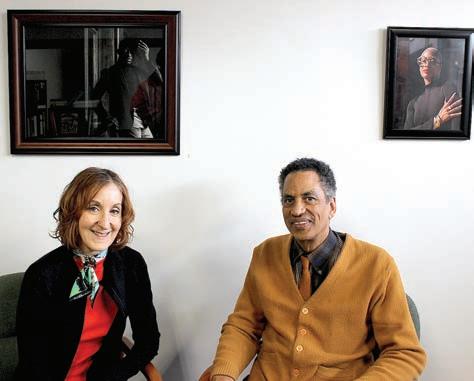
“We were looking for dynamic photographers.” Billy Hunter told us as he stood in his gallery surrounded by stunning visual pieces curated by him and his wife. “But at the same time, we were kind of trying to stay away from commercial works.”
“No advertising imagery.” Jeanie added. “Not something you’d see in a magazine. I think that was a big part of our decision process. We had a lot of entries and we chose the ones that we saw to have something intriguing in them.”
Their latest exhibit, “Black Men with Cameras,” is a perfect example of the kind of work they want to do through their building. As the name suggests, the feature is a collection of works from Black male photographers from southeast Michigan. The idea for the show came while Billy was joking with some friends about the theme for their next show. And as the mind credited with naming his office space gallery “Office Space Gallery,” it seemed only natural to name a show created by Black men with cameras “Black Men with Cameras.” The choice to keep it local was a much simpler and relatable decision. As native Detroiters, they felt no need to look past their own backyard for Black talent despite the fact that they were no strangers to working with artists from all over.
Jeanie explained to us, “It always depends on the show because we do work with national artists and sometimes international. But, I see that this city is full of talent. A lot of it. We’re from Detroit, so we wanna be on the map too! We wanna showcase the talent that’s here. This has some novice photographers and some very experienced photographers. There are a few in this show that have never shown art before, so why not be a place of opportunity for those students of art, so to speak?”
Supporting developing artists is a core value of the Office Space Gallery. Beyond visibility, the Hunters help artists grow their art to be more appealing to galleries and

By Ebony JJ Curry SENIOR REPORTER
The city’s skyline is set to pulse with the brilliance of more than 10,000 pyrotechnic effects; all choreographed to music and movement that reflect Detroit’s rhythm and resolve. The 2025 Ford Fireworks will lift off over the Detroit River on June 23 at 10 p.m., reminding this city of its power to bring people together, uplift spirits, and claim joy, boldly and publicly. This isn’t about spectacle for the sake of flash. This is about culture. About legacy. About Detroit.
Produced by The Parade Company and made possible through a decades-deep partnership with Ford Motor Company, this year’s event marks the 67th annual celebration of what’s grown into one of the most iconic fireworks shows in the country. And this year’s theme—“Detroit Summer Vibes! Bring ‘Em On!”—is more than a tagline. It’s a declaration.
“This show is one of the most celebrated in America, and we are elated to bring Detroit and well beyond this spectacular summer fireworks display,” said Tony Michaels, president and CEO of The Parade Company. His words reflect what so many Detroiters already know: this night is about more than fireworks. It’s about identity. It’s about home.
Each year, hundreds of thousands of people line the riverfront, gathering at Hart Plaza, Belle Isle, and rooftops across downtown to watch the show illuminate the night sky. This year’s presentation will dazzle for 24 minutes, produced in collaboration with Zambelli Fireworks, the legacy family-owned company known globally for crafting world-class firework displays.
It’s a moment that reclaims public space for celebration. That affirms Black joy in public as a form of resistance and restoration. That uplifts families, couples, children, elders—all gathered under one sky, watching Detroit shine.
“Ford is proud to be a longtime partner of The Parade Company and to support one of the most spectacular fireworks displays in the country,” said Mary Culler, president of Ford Philanthropy. “We look forward to bringing everyone together to celebrate and honor America, our great city and the people and communities that make Detroit so special.”
These words ring especially strong when you understand the roots of Ford’s footprint in Detroit. The company’s relationship with this city has run for generations. But it’s the people of Detroit who give these partnerships meaning—who show up, who dance on sidewalks, who hold children on shoulders to see sky streaks of blue, gold, red, and green.
The Ford Fireworks isn’t just about pyrotechnics—it’s the gathering itself that gives it purpose. It’s the music blaring from lawn speakers, the folding chairs lined up early in the morning, the elders who’ve come every year since they were children, now guiding their grandchildren through the same experience.
WDIV-Local 4 will carry the event live for those who can’t make it downtown, bringing the show into homes across Michigan. 760 WJR and Paul W. Smith will provide special radio coverage, making sure every corner of the community has access to the celebration, whether through a TV, a car radio, or streaming from a phone.
But for those looking to elevate the experience, the Ford Fireworks Rooftop Fundraiser offers another level. Presented by Ford Motor Company, the rooftop event promises front-row views of the sky show, paired with food from Andiamo, music by Your Generation in Concert, and an atmosphere made for dancing, reminiscing, and reveling in Detroit’s beauty. Tickets for the rooftop fundraiser are $350, with children six and under priced at $125. Proceeds support the Michigan Thanksgiving Parade Foundation—yet another reflection of how Detroit’s joy is rooted in service, tradition, and community investment.
By Amber Ogden STAFF WRITER
Detroit is welcoming a new kind of startup to town, one that’s turning church basements and fellowship halls into engines for economic growth. ChurchSpace, a tech company originally launched in Texas, is relocating its national headquarters to Detroit and partnering with the city to help churches rent out underutilized spaces, such as kitchens and event halls, to local entrepreneurs and community groups.
ChurchSpace’s arrival marks a major investment in Detroit’s growing tech ecosystem and faithbased community infrastructure. The platform allows churches to earn supplemental income by renting out space to small businesses, food entrepreneurs, and service providers, an approach that city leaders hope will bolster neighborhood stability and entrepreneurial activity.
“We are thrilled that ChurchSpace sees Detroit as the perfect place for their innovative business to be supported and grow,” said Mayor Mike Duggan.

“Our churches have long been a critical backbone of our neighborhoods—feeding families, mentoring youth, and caring for those in need—and through ChurchSpace’s innovative work, they will be able to generate more resources to do their work.”
As part of the partnership, ChurchSpace will launch a Detroit pilot program that will activate up to 15 churches across the city. Participating churches will receive training and onboarding support from the ChurchSpace team, enabling them to begin renting out
space via the platform. ChurchSpace co-founders Emmanuel Brown and Day Edwards, both children of pastors, bring nearly a decade of startup
“Detroit is the ideal home for innovative startups like ChurchSpace,” Brown said.
“With its rich faith community, strong civic leadership, and growing tech ecosystem, the city is poised to lead the nation in rethinking how sacred space can power economic mobility in neighborhoods.”
Churches that have already used ChurchSpace’s platform in Texas have seen significant returns.
“Since 2023, our top-performing churches have generated nearly $100,000 per year in new revenue,” Edwards said.
“These funds have been reinvested into ministries, food programs, and critical community services. We believe Detroit churches can lead the way in scaling this impact.”
From page B-1
To reserve a table or secure tickets, people can call 313923-7400 or visit theparade. org. But act fast—this event sells out, year after year.
Beyond the fireworks, beyond the music and the glow, this celebration holds cultural weight. It belongs to a city that’s known hardship, yes—but also knows how to lift up its people, how to reclaim joy, and how to do it loudly.
Detroit’s summer doesn’t start with a whisper. It begins with thunderclaps of light across the river, with cheers echoing through buildings, and with people standing shoulder to shoulder, looking up, remembering what makes this city unstoppable.
The Ford Fireworks has been nominated for “Best Place to See Fireworks” by USA Today, a nod to what locals have long known. This is not just a great show—it’s a communal rite. Voting is open daily until May 12 at 11:59 a.m. EST at theparade. org and across The Parade Company’s social media channels. This nomination matters—not for clout, but for recognition of what Detroit builds every single summer: something worthy of national eyes, rooted in local pride.
From page B-1
The move is expected to create more than 150 new jobs in Detroit over the next three to five years. These will include roles within the startup itself, technical, operational, and support positions, as well as indirect jobs in logistics, event services, and delivery management as church campuses activate underutilized assets.
Justin Onwenu, Director of Entrepreneurship and Economic Opportunity for the City of Detroit, highlighted ChurchSpace represents the kind of innovation that aligns perfectly with Detroit’s values, creative, community-rooted, and committed to economic opportunity.
Each flash across the skyline is a visual chorus, singing stories of resilience, celebration, and unity. It’s not just what we see. It’s what we feel standing under it.
This is for the parents who packed coolers before sunrise. For the teens meeting friends by the monument. For the vendors who know this night will feed their families. For the kids whose first memory of fireworks will be etched above the river that raised their city.
This event belongs to all of Detroit. And Detroit belongs to no one but its people.
As the countdown begins toward June 23, the city starts preparing—not just for a show, but for a moment. A moment that reminds us what happens when public space is filled with light, laughter, and legacy. When corporate partnerships serve community joy. When Detroit says loud and clear: we are here, we are vibrant, and we will shine.
This is not about spectacle. It’s about solidarity. It’s about summertime in a city that knows how to survive, how to thrive, and how to throw a celebration that reflects it all.
Detroit Summer Vibes. Bring ‘Em On.
“This partnership uplifts forward-looking and civic-minded technology to unlock new pathways for economic growth in our neighborhoods,” Onwenu said.
With the pilot program on the horizon and a headquarters move underway, ChurchSpace’s Detroit chapter is shaping up to be more than just a new office; it’s a bold vision for how faith, tech, and urban innovation can intersect for meaningful change.
The Detroit pilot will launch with a cohort of churches across the city. Churches interested in participating should apply here and are encouraged to attend Churchspace’s May 30th informational event at BasBlue 110 East Ferry Street, Detroit, MI 48202.
From page B-1
give them a chance to be purchased by collectors. Things like presentation, framing, and even pricing can affect how well someone’s art travels. But by the time a new artist’s piece is hanging on the walls of their gallery, they’re meeting the same standard as pieces from more experienced artists. Still, the most valuable thing they offer to creatives is the chance for their work to be put on display for the public. And for featured photographer Felix Davis, exposure is much more than simply a chance to show off.
“It’s a great opportunity to get exposure as a Black photographer. This is my first gallery that I’ve ever been in, so it was great to put the work out there and get into different
rooms that I never thought I would be in. It’s a platform that I think more Black photographers need so the work can be seen in a different aspect rather than just on a phone screen, a tablet, or a computer. You can see it on a wall in a gallery printed.
It’s also a great chance to control our narrative. Being a photographer as a Black man is an opportunity for people to see how we view the world creatively and what we see through our eyes. We’re just using the camera as the tool to show it to the world. Black men with cameras are powerful because nobody can tell our stories like us. We get tell our stories and we need these kinds of spaces to do so.”
It’s that exact motivation that keeps Billy and Jeanie working hard to improve their gallery. Despite being less profitable than renting out to tenants, the Hunters have found something that they can do to feed the ever-vibrant culture of Detroit
and stay in touch with the world of art that they love so much. As they move on to a new exhibit and add more to their space, such as a reading room, the two of them think of what kind of place they ultimately want the Office Space gallery to be and what they want visitors to see when they step through the doors.
“I hope people see the talent in Detroit.” Billy stated. “I want them to see that this is a great space and a welcoming space. Where they’ll be well taken care of, and where they’ll want to come back to and see more of what we can put together.”
Jeanie nodded. “I agree with all of that. I think that if they walk in here they’re going to see Detroit. They’re gonna see Detroit in all of its forms. Anybody can come in here and take a look around, we get a variety of visitors. Just know that we’re here and we want you to come by and see us.”

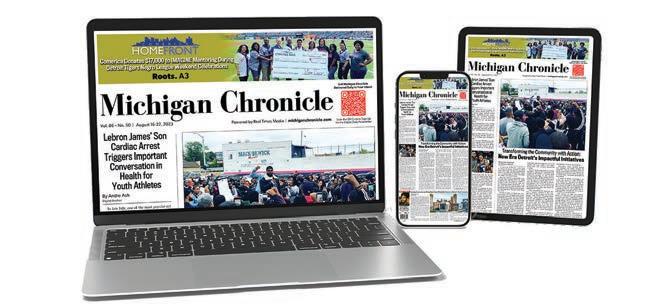


By Amber Ogden STAFF WRITER
Three students from Breithaupt Career Technical Center are bringing home the gold after clinching first place in the Community Service category at the 2025 SkillsUSA Michigan State Leadership and Skills Conference, held April 11–13 in Grand Rapids, Michigan.
Anthony Bronaugh, Dominique Hubbard, and Da’Juan Jackson-Groves stood out among hundreds of students from across the state for their impactful, youth-led Community Service Project. With a mission to promote inclusion and give back to the local community, the trio’s work revolved around supporting Special Olympics Unified Sports and organizing critical outreach events, including a toy drive, canned goods collection, and a Thanksgiving basket giveaway.
Tanisha Bronaugh, Work-Based Learning Placement Coordinator, and coach highlighted that watching Anthony, Dominique, and Da’Juan grow through this project has been one of the most rewarding experiences as their SkillsUSA Advisor.
“Their dedication, teamwork, and heart for service truly embodies what SkillsUSA stands for,” Bronaugh said.
“Seeing them take the stage at the State Championship and win gold was incredible, but the true victory was the leaders they became along the way.”
Their efforts, which combined strategic planning, empathy, and hands-on action, captured the judges’ attention and ultimately secured them the coveted gold medal.
The award-winning project placed inclusion at its core by aligning with the values of the Special Olympics Unified Sports program, which brings together athletes with and without intellectual disabilities to train and compete on the same team.
By supporting this initiative, Bronaugh, Hubbard, and Jackson-Groves not only raised awareness about the impor-
By Dr. Kristen Barnes-Holiday
WRITER
CONTRIBUTING

Recently, I read a piece that essentially illuminated how many folk find joy in acknowledging Jesus’ Resurrection yet shy away from the pain that He experienced. I pondered this assertion, and honestly, I thought about this for several days before eventually realizing that only privilege would allow a saint to bask in Jesus’ rising without even thoroughly digesting or blinking an eye at His

tance of diversity and unity in sports but also emphasized the role of student leaders in fostering inclusive environments.
“SkillsUSA showed me that when you put your heart into something, the impact goes far beyond a medal,” Dominique said.
In addition to their work with Unified Sports, the students took their commitment to service even further. They organized a toy drive during the winter holiday season, collecting and distributing gifts to children in need.
They followed that up with a school-wide canned goods collection, donating hundreds of non-perishable food items to local shelters and food banks. Just before Thanksgiving, they led the effort to distribute customized baskets filled
pain. And as I examined this thought even closer, I decided that my positionally as a Black woman--thick-lipped, nappy-haired-allows me to see Jesus through a unique lens; one that is multidimensional, filled with joy and simultaneous pain; one that centers oppression and marginalization, often biblically and otherwise justified by His adverse beliefs and ethic appearance; one that is empathetic and works in the capacity of Caregiver yet He is cared for both earthly and eternally.
But I get stuck at Jesus’ pain. Yes, I love that He rose. And of course I get excited about Him granting us life eternally. But the pain and suffering that Jesus endured to give Christians the ultimate gift of salvation is front and center in my mind. Understanding and embracing my Blackness, both historically and contemporarily, has forced me to first identify with Jesus’ suffering followed by His triumphs.
I think of my great-great-great-grandmother, who was a slave, and though I’ve seen her picture and know her story, we’ve
with groceries to families facing food insecurity, an initiative that directly served dozens of households in the Detroit area.
“Winning gold was amazing, but what really mattered was knowing we made a difference in our community and grew stronger as a team,” Da’Juan said.
The SkillsUSA Michigan State Leadership and Skills Conference is a highly competitive event, drawing more than 2,000 students from career and technical education (CTE) programs statewide. The Community Service competition recognizes projects that demonstrate the value of giving back, teamwork, and effective communication. Contestants are judged not only on the impact of their service but also on the professionalism of their presentation and the clarity of their project documentation.
Bronaugh, Hubbard, and Jackson-Groves spent months preparing for the event, developing their project portfolio, crafting their presentation, and refining their speaking skills. Their commitment paid off with a gold medal finish, advancing them to the national stage.
With the state championship behind them, the Breithaupt trio is now gearing up for the 2025 SkillsUSA National Leadership and Skills Conference, set to take place in Atlanta, Georgia, this June. There, they’ll represent Michigan and compete against top teams from across the country. School staff, peers, and community members are coming together to support the students as they prepare for the next stage of their journey. In a year filled with challenges and changes, these three students have demonstrated that service, inclusion, and leadership are not just ideals; they are actionable plans. With gold medals around their necks and the backing of an entire community, they are ready to take their mission and message to the national spotlight.
“Every event we participated in and the time we spent working with Special Olympics Unified Sports athletes taught me the real meaning of leadership, service, and teamwork,” Anthony said.
never met. However, I’m inclined to believe that during a time when she lost all of her children to the slave trade, was likely given an augmented form of the Bible, and endured repeated abuse, she only had the Lord to cling to in times of great distress.
The pain that she experienced, though unimaginable, likely helped her identify her human existence with Jesus’; He suffered, and so did she and He also experienced a great reward at the end of His suffering and therefore perhaps she believed that she would as well. Jesus was my ancestors’ anchor as they endured the struggles associated with slavery, Jim Crow and even today as we navigate corporate workplaces, home ownership journeys and beyond. Generationally, we’ve been taught that if we have nothing else we have faith; that when hard times arise God is still God; that Jesus endured so that we might have life everlasting and we take this to heart; that Jesus’ suffering was not in vain, and we, too, believe that ours isn’t either.
Our grandmothers, Big Ma’s and ances-
tors passed down wisdom, but they also gifted us the importance of maintaining faith and keeping the larger picture in mind when adverse circumstances arise. Through my great-grandmother’s lens, and her matriarchs, pain was viewed only as a means to Gods blessings. Jesus’ pain led to our salvation and my great-greatgreat grandmothers pain led to becoming a free woman and finding all of her children except 1.
As we’ve recently celebrated Resurrection Sunday, we spent time reveling in Jesus’ Rising from the tomb, but let’s not ever forget the pain that He endured as He lived and died on the cross.
Love and blessings...
Dr. Kristen Barnes-Holiday, Ph.D., is a professor of English at Wayne County Community College District, a second-year divinity student at Duke University, and a Christian blogger. In addition, she is a teacher, preacher, and lifelong student of the Word of Jesus Christ.

Fueling Michigan today and tomorrow. Every day, Michiganders depend on secure, reliable energy to heat their homes, fuel businesses, and power industries. Enbridge proudly delivers 55% of the propane used in Michigan.
We continue to modernize our energy infrastructure and further protect the Straits of Mackinac crossing by investing in the Great Lakes Tunnel.
As a North American integrated energy company, we’ve been delivering the energy the state needs for decades and we’re investing in Michigan communities and infrastructure. It’s how we’re building toward a better tomorrow.
Discover more at enbridge.com/Michigan.
By Amber Ogden STAFF WRITER
United Way’s Summer Discovery program is expanding in a big way, thanks to a $60 million investment from the Ballmer Group. Designed to combat summer learning loss, the program offers free, high-quality academic and enrichment experiences for K–8 students across Wayne, Oakland, and Macomb counties.
This couldn’t come at a better time, as the Trump administration has initiated significant actions to dismantle the U.S. Department of Education. On March 20, 2025, he signed an executive order directing the department to be dismantled as much as legally possible, aiming to return authority over education to states and local communities. While completely abolishing the department would require congressional approval, the administration is actively reducing its functions and workforce.
In response to these developments, programs like United Way’s Summer Discovery are expanding to fill potential gaps. This summer, the program will serve over 32,000 K–8 students across 188 sites in Macomb, Oakland, and Wayne counties, a significant increase from last year’s 17,000 participants. These engaging, hands-on activities promote both academic success and social-emotional development. Applications for parents are now open.
The program is already showing impressive results, with a 200% increase in ELA proficiency and a 150% increase in math proficiency among participants. Families are seeing the impact too, 88% of parents

said the program prepared their child for the school year, and 83% reported growth in their child’s personal development.
Currently, 43 schools aim to enroll as many as 5,000 students from Wayne County. The over $47.7 million being allocated to the region is part of a broader investment totaling more than $60 million from Ballmer Group throughout southeast Michigan. In total, the goal is to enroll 32,000 students.
Dr. Darienne Hudson, president and CEO of United Way for Southeastern Michigan, highlighted that providing high-quality
By Amber Ogden Staff Writer
A new children’s book is making waves even before it hits shelves. Your Crown Shines, written by award-winning poet and activist jessica Care moore and illustrated by the luminous talent of Dare Coulter, is more than just a picture book, it’s a cultural celebration, a poetic biography, and a heartfelt love letter to generations of Black girls everywhere. Inspired by the trailblazing legacy of U.S. Supreme Court Justice Ketanji Brown Jackson, the book will be released on June 24, 2025, by HarperCollins.
Part biography, part anthem, Your Crown Shines honors Jackson’s historic rise to the nation’s highest Court while weaving in universal themes of strength, perseverance, and pride. The book is rooted in Moore’s original poem, “Her Crown Shines,” which first captivated audiences at a private prayer gathering hosted by the Win With Black Women collective, a network of over 3,000 Black women leaders.
Among those moved by the poem’s powerful message was none other than Oprah Winfrey, who later published it on Oprah Daily, declaring it a “melodic rallying cry for the next generation.”
“This uplifting poem, written by jessica Care moore, about Ketanji Brown Jackson spoke to my spirit, especially this line: “Black girls carry constellations inside their wombs waiting to be named.” And I wanted to share it with you all,” Winfrey said.
“Mountains high, rivers deep.
We recognize the majesty.
Destiny says we are meant to be.”
These opening lines set the tone for a work that is as lyrical as it is empowering. Each page invites young readers to see themselves reflected in the strength of a woman who defied the odds

and broke barriers and to believe in their own capacity for greatness.
The book comes at a time when representation in children’s literature remains a pressing issue.
According to the Cooperative Children’s Book Center, only 13% of children’s books published in 2023 featured Black characters. Your Crown Shines helps shift that landscape by centering a powerful narrative that is both personal and collective, a fusion of one woman’s biography with the broader story of Black girlhood and triumph.
Justice Jackson’s confirmation to the Supreme Court in 2022 marked a watershed moment in American history. She became the first Black woman to serve on the Court, a milestone that sparked nationwide celebrations and inspired conversations about visibility, access, and legacy. But moore’s book doesn’t just recount facts, it sings. Through poetry and art, it captures the emotion, the pride, and the intergenerational significance of that moment.
Illustrator Dare Coulter brings Moore’s words to life with vibrant, dynamic imagery that radiates joy, power, and softness all at once. Coulter’s work, known for honoring the beauty and dignity of Black communities, creates a visual journey that is as compelling as the verse itself.
that every little Black girl carries a crown of her own, is one that resonates deeply at a time when affirming messages for youth are urgently needed.
Teachers, parents, and community leaders are already lining up to incorporate the book into curriculum and literacy programs. HarperCollins has announced plans for a nationwide book tour and school visits this fall, aimed at creating interactive experiences for young readers and fostering conversations around Black history, civic leadership, and self-worth.
As anticipation builds ahead of its June release, Your Crown Shines is poised to become a new classic in the canon of empowering children’s literature. It’s a reminder that stories, especially those grounded in truth, pride, and poetry, can shape how children see themselves and the world around them.
And for every young reader who picks up this book and sees a reflection of possibility in its pages, the message will ring loud and clear: your crown shines, too.
“Last year, participating Detroit area students saw gains, including increases in math achievements and educational engagement,” Dr. Hudson said.
“The data underscores what parents and families already know: students succeed when they have access to high-quality summer learning opportunities in their communities.”
Launched in 2024, Summer Discovery has already proven its effectiveness. According to program data, students experienced an average 16-point increase in English Language Arts (ELA) and a 14-point increase in math from pre- to post-tests.
Educators also observed notable growth, especially among students who entered the program, who were the furthest behind academically.
Mariam Farhat, Principal of Henry Ford Elementary in Dearborn and a 2024 site leader, emphasized that Summer Discovery
provided our students at Henry Ford not only an academic extension of the school year with a focus on math and literacy but also a way to enrich their learning in non-traditional environments.
“They had daily opportunities for handson science, swimming, team sports, and more , things they wouldn’t normally experience during the regular school year,” Farhat said.
Summer Discovery offers a distinctive learning experience that goes beyond the traditional classroom setting by combining academic instruction with a wide array of enrichment opportunities. Participants engage in stimulating STEM projects and coding, embark on outdoor adventures and field trips, and explore their creativity through music, art, and creative expression.
Kiada Shanklin, whose sons Kyon, 7, and Khalil, 10, participated last year, highlighted as a parent she is grateful for this summer mentorship program.
“They had the incredible opportunity to engage with mentors who not only provided training in mathematics and leadership but also served as role models,” Shanklin said.
“For the first time, they were truly inspired to embrace their potential.”
Additionally, the program promotes physical health and wellness through various sports activities while also emphasizing social-emotional learning experiences, ensuring a well-rounded development for all participants.
“With nearly twice the number of students able to participate this year, we are thrilled to expand access to this life-changing program and encourage families to enroll now to take advantage of this incredible opportunity,” Dr. Hudson said.
Enrollment for Summer Discovery 2025 is now live. Participation is free, and families can locate schools or community-based organizations (CBOs) offering the program through the Summer Discovery Site Finder.
To explore programs and register, families can visit https://unitedwaysem.org/resources/summer-discovery/locations/




Your Crown Shines is as much a storybook as it is a manifesto. Its core message,







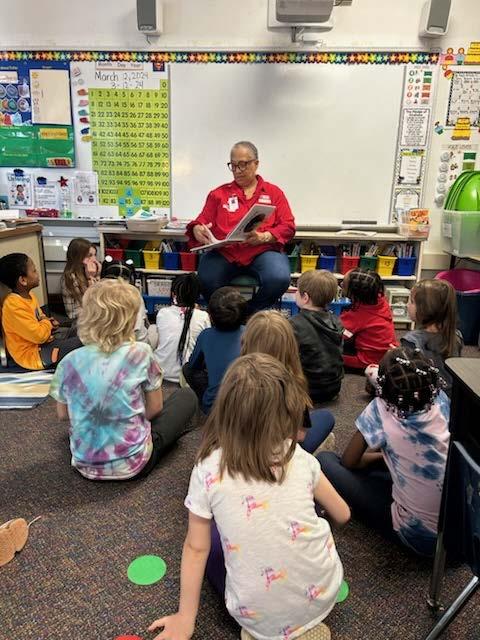

Proposals must be submitted electronically via Building Connected by due date and time. Late bids will not be accepted.
The Public Opening will occur virtually at 12 p.m. on May 27, 2025 and can be viewed at the below link:
https://tinyurl.com/2n52j4js
Call-In: +1 313-462-2305
Conference ID: 910 514 477#
This Project is subject to Michigan State Prevailing Wage Laws (Michigan Public Act 10 of 2023) and the Contractor must pay prevailing wages and fringe benefits to all of Contractor’s, and is subcontractors’, construction mechanics working on the Project in accordance with Michigan Public Act 10 of 2023. All bids must be accompanied by a sworn and notarized statement disclosing any familial relationship that exists between the submitting company and any employee of DPSCD. DPSCD shall not accept a bid that does not include this sworn and notarized disclosure statement. A bid bond in an amount not less than five percent (5%) of the base bid is also required.

The Detroit Public Schools Community District is seeking qualified environmental contractors to perform remediation and abatement services under RFP 26-0005.
There will be a pre-bid meeting for this RFP hosted virtually on May 6, 2025 at 11 a.m. The conference can be viewed using the following link:
https://tinyurl.com/zs2w6kr5
Call-In: +1 (313) 462-2305 Conference ID: 828 913 255#
Proposals are due electronically via DemandStar by 12 p.m. on May 22, 2025. Late bids will not be accepted.
A virtual Public Opening will occur at 12 p.m. on May 22, 2025 and can be viewed using the below link:
https://tinyurl.com/ms4jv6cz
Call-In: +1 (313)-462-2305 Conference ID: 670 491 948#
This project is subject to Michigan State Prevailing Wage Laws (Michigan Public Act 10 of 2023) and the contractor must pay prevailing wages and fringe benefits to all its contractors, subcontractors, and construction mechanics working on the project in accordance with Michigan Public Act 10 of 2023.
All bids must be accompanied by a sworn and notarized statement disclosing any familial relationship that exists between the submitting company and any employee of DPSCD. DPSCD shall not accept a bid that does not include this sworn and notarized disclosure statement.
If you have questions, please contact the Procurement Department at (313) 873-6531.
SURVEY DEVELOPMENT, DISTRIBUTION AND ANALYSIS
October 2022
- Legal Notice
The Detroit Service Learning Academy District announces the 2025/26 open enrollment period for grades K-8 through Tuesday, May 27 between the hours of 8:00 a.m. and 4:00 p.m. at the Detroit Service Learning Academy 21605 W. 7 Mile Rd. Detroit MI 48219, the Redford Service Learning Academy 25940 Grand River Ave. Redford MI 48240 or Oak Park Service Learning, 21700 Marlowe, Oak Park, MI 48237 (Grades K-8).
Notice is hereby given that the Highland Park City Council will hold a Public Hearing
Monday, May 5th, 2025 7:00 p.m.
Robert B. Blackwell Municipal Complex Council Chambers 2nd floor 12050 Woodward Ave.
Highland Park, Michigan 48203
The purpose of the hearing is to receive comments regarding FY 2025 - 2026 Water Department budget & rates.
A copy of the proposed 2025-2026 Water Budget and Rates is available at the Water Service Center 14110 Woodward Avenue.
Request for Proposal: Partner with Us to Improve Lives!
We are seeking experienced, licensed contractors to join our team for an exciting opportunity under the U.S. Department of Housing and Urban Development (HUD)
Older Adults Home Modification Program
This program is focused on providing critical home modifications that enable older adults to remain safely in their homes, maintain independence, and enhance their quality of life. This project include installation of grab bars, accessibility ramps, walk-in tubs, widening doorways, improved lighting, and other aging-in-place upgrades.
CONSULTANT – CUSTOMER SERVICE AND SECRET SHOPPER SURVEY
Brenda Green City Clerk
NOTICE OF PUBLIC HEARING
We are looking for contractors who: Are licensed, insured, and bonded.
DEVELOPMENT, DISTRIBUTION AND ANALYSIS
October 2022
Notice is hereby given that the Highland Park City Council will hold a Public Hearing Monday, May 5th, 2025 7:00 p.m.
Robert B. Blackwell Municipal Complex Council Chambers 2nd floor 12050 Woodward Ave. Highland Park, Michigan 48203
The purpose of the hearing is to receive comments regarding Proposed FY 2025 - 2026 General Operating Budget.
A copy of the proposed 2025-2026 General Operating Budget is available online at highlandparkmi.gov on the City Clerk’s page and for viewing at the City Clerk’s office, 12050 Woodward Avenue, Monday – Thursday 9:00 a.m. – 3:00 p.m. or Fridays 9:00 a.m. – 12:00 p.m.
• Have experience with residential remodeling, accessibility modifications, or aging-in-place improvements/ modifications. Are committed to quality workmanship and customer service.
Scope of Work Includes: Installation of home safety and accessibility features. Minor home modification as needed and prescribed by a licensed occupational therapist. Compliance with HUD grant requirements, and state local regulations.
Interested? Please submit your qualifications, relevant experience, and licensing information to: Franklin Wright Settlements, Inc. (HUD) Older Adults Home Modification Program ATTN: Ahmad Nassar 3360 Charlevoix
Detroit Local Initiatives Support Corporation (LISC) is seeking proposals for a qualified consultant to work with Detroit LISC to create, distribute and analyze customer service surveys to gather information about the services of the Detroit at Work One Stop System. The findings from the surveys will be analyzed and put into interim and final reports to be submitted to LISC.
Specifically, Detroit LISC is seeking those with proven experience in the following areas:
Evaluation
Brenda Green City Clerk
REQUEST FOR QUOTES
Survey Creation, Distribution and Collection
The Suburban Mobility Authority for Regional Transportation (SMART) is soliciting RFQ Control No. 25-4076 for A/C Recovery Machines. RFQ forms were available beginning April 28, 2025, from http://www.mitn.info. Bids are due by 3:00 PM ET, May 14, 2025.
REQUEST FOR QUOTES
The Suburban Mobility Authority for Regional Transportation (SMART) is soliciting RFQ Control No. 25-4240 for Refrigerant (R134) Canisters RFQ forms were available beginning April 28, 2025, from http://www.mitn.info. Bids are due by 3:00 PM ET, May 14, 2025.
REQUEST FOR QUOTES
The Suburban Mobility Authority for Regional Transportation (SMART) is soliciting RFQ Control No. 25-4236 for Floor Mat Rental. RFQ forms may be obtained beginning May 2, 2025, from http://www.mitn.info. Bids are due by 3:00 PM ET, May 23, 2025.
Analysis
Report Development
Program
live within commuting distance of stated office. Serve as a test specialist for the powertrain manufacturing engineering organization with a focus on electrification (e-Transaxle programs). EOE. Apply online: corporate.ford.com/careers
Visit https://www.lisc.org/detroit/about-us/careers/ to download full RFP. Responses to this RFP are due Friday, October 21 and should be emailed to kgallick@lisc.org. LISC is committed to working with Small Business Enterprises (SBEs), Minority-Owned Business Enterprises (MBEs), and Women-Owned Business Enterprises (WBEs). LISC encourages submissions from SBEs, MBEs, and WBEs.
The Suburban Mobility Authority for Regional Transportation (SMART) is soliciting RFQs for Pre-Employment, Drug, and Alcohol Screenings Control No. 23-3659. RFQ forms may be obtained beginning October 19, 2022, from http://www.mitn.info. RFQs are due by 3:00 PM ET, November 11, 2022
Detroit Local Initiatives Support Corporation (LISC) is seeking proposals for a qualified consultant to work with Detroit LISC to create, distribute and analyze customer service surveys to gather information about the services of the Detroit at Work One Stop System. The findings from the surveys will be analyzed and put into interim and final reports to be submitted to LISC. Specifically, Detroit LISC is seeking those with proven experience the following areas:
Evaluation
Survey Creation, Distribution and Collection ✓ Analysis ✓ Report Development ✓ Program Design
In the event, student enrollment applications exceed available space, a random selection drawing will be held if needed on Monday, August 18, 2025 8 a.m. to 4 p.m. held at 21605 W. Seven Mile Rd. Detroit, MI 48219. This institution is prohibited from discriminating on the basis of race, color, national origin, sex and disability.

3 cols x 2.75 inches

Visit https://www.lisc.org/detroit/about-us/careers/ load full RFP. Responses to this RFP are due and should be emailed to working with Small Business Enterprises (SBEs), Minority-Owned Business Enterprises (MBEs), and Women-Owned Business Enterprises (WBEs). LISC encourages submissions from SBEs, MBEs, and WBEs.







Detroit People Mover/Detroit Transportation Corporation 535 Griswold St Ste # 400
Notice of Budget Hearing
The Detroit Achievement Academy District (MI PSA) shall hold a public budget hearing for its 2025-2026 annual operating budget on May 13th at 6:00pm at 8411 Sylvester, Detroit, MI 48214.A copy of the budget is available for public inspection at: www.detroitachievement.org/budget
BID # 07-01-2022 REBID
The Detroit Transportation Corporation Office of Contracting and Procurement requests proposals from qualified firms to provide CCTV and network upgrades. This includes modernization efforts for the CCTV system, Public Address (PA) system, Variable Message Signs (VMS), and Wired Backbone Network system, at the MCF, at each DPM station, and at substations described herein.
All bids must be received by the Detroit Transportation Corporation via Bidnet/MITN on or before 5:00 p.m. (EST) November 7, 2022.




A pre-bid site visit will be determined at a later date, if necessary. Proposals can be accessed on the Bidnet Direct www.bidnetdirect.com//detroit-transportation-corporation
Mike Anderson Procurement Manager mandersonjr@thepeoplemover.com


the finances of assigned projects & ensure deliverables are made with acceptable quality while staying under targeted budgets. We maintain a drug-free workplace & perform pre-employment substance abuse testing. Refusal to submit to testing will result in disqualification of further employment consideration. Qualified applicants should e-mail resume & verification of reqs. to Allison Domen, Human Resources Manager, Metro Engineering Solutions, LLC at adomen@metroes.net.
a.m. October 21, 2022.




4 cols x 3.5 inches
Detroit People Mover/Detroit Transportation Corporation 535 Griswold St Ste # 400 Detroit, MI 48226

The due date for Proposals is November 10, 2022 at 12:00 p.m.
The Detroit Transportation Corporation Office of Contracting and Procurement requests proposals from qualified Contractor/Firm(s) to provide annual geometry measurements of the LIM rail height, power rail tolerances, running rail height and
The initial information and subsequent trending information on the rate of change of the measured parameters of the Detroit People Mover (DPM) track will be reviewed and utilized as part existing detailed maintenance plan to ensure long term
If you have questions, please contact the Procurement Department at (313) 873-6531. REQUEST FOR PROPOSALS


All bids must be received by the Detroit Transportation Corporation via Bidnet/MITN on or before 5:00 p.m. (EST) November 7, 2022. A pre-bid site visit is scheduled for Wednesday, October 25, 2022 at 10:00 a.m. (EST). Proposals can be accessed on the Bidnet Direct www.bidnetdirect.com//detroit-transportation-corporation
Mike Anderson Procurement Manager mandersonjr@thepeoplemover.com



